Personal and Professional Development Assignment Solution - Travelodge Hotel
VerifiedAdded on 2020/12/23
|18
|5498
|415
AI Summary
Contribute Materials
Your contribution can guide someone’s learning journey. Share your
documents today.
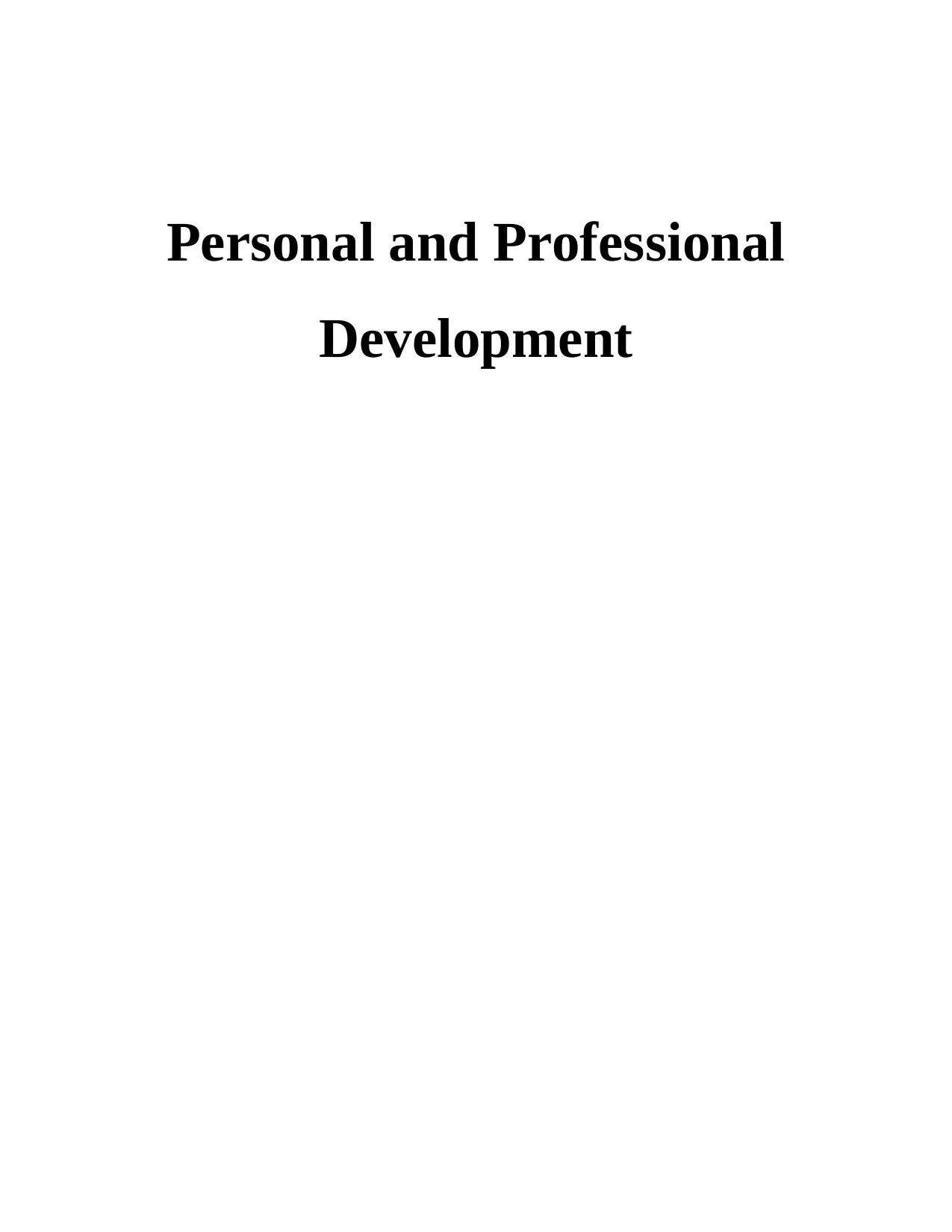
Personal and Professional
Development
Development
Secure Best Marks with AI Grader
Need help grading? Try our AI Grader for instant feedback on your assignments.
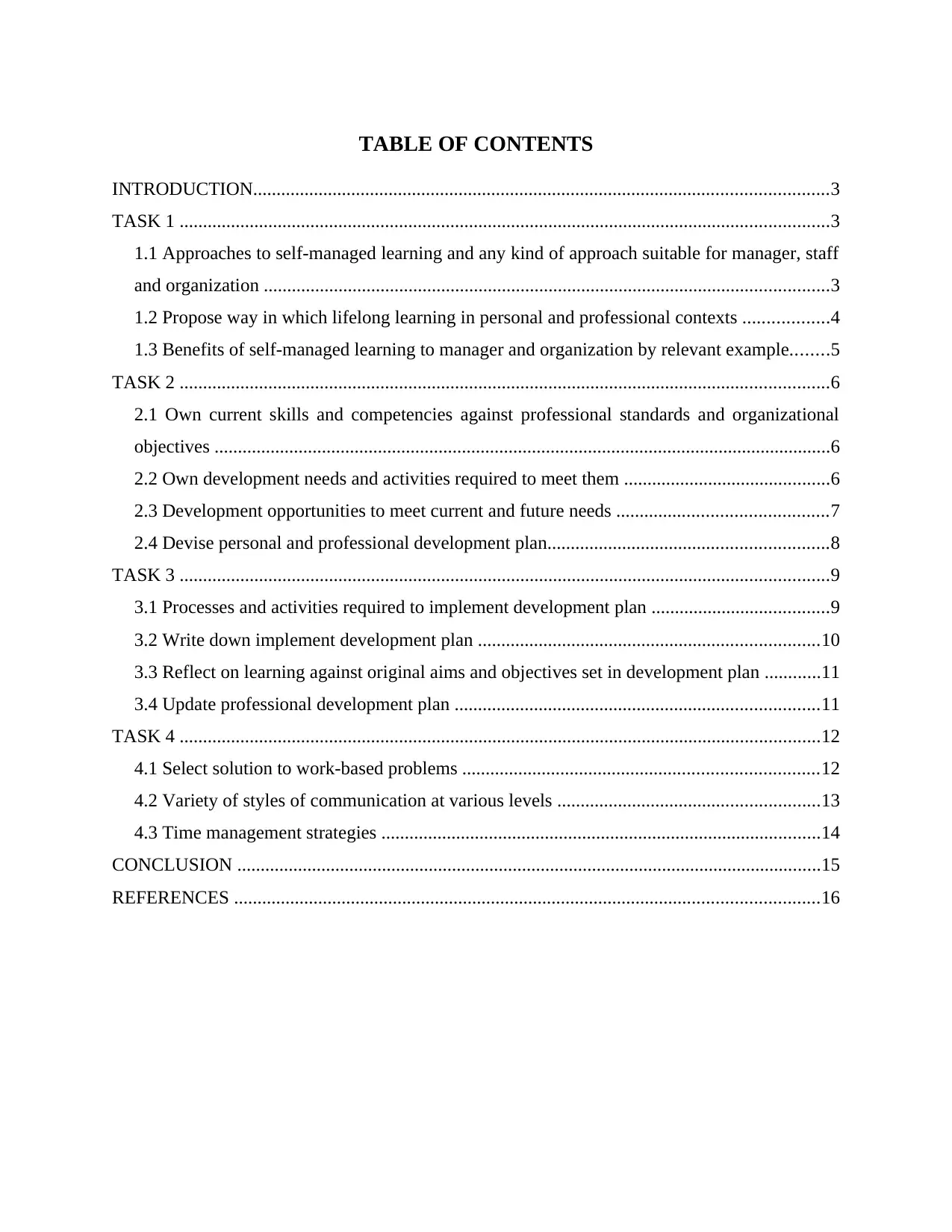
TABLE OF CONTENTS
INTRODUCTION...........................................................................................................................3
TASK 1 ...........................................................................................................................................3
1.1 Approaches to self-managed learning and any kind of approach suitable for manager, staff
and organization .........................................................................................................................3
1.2 Propose way in which lifelong learning in personal and professional contexts ..................4
1.3 Benefits of self-managed learning to manager and organization by relevant example........5
TASK 2 ...........................................................................................................................................6
2.1 Own current skills and competencies against professional standards and organizational
objectives ....................................................................................................................................6
2.2 Own development needs and activities required to meet them ............................................6
2.3 Development opportunities to meet current and future needs .............................................7
2.4 Devise personal and professional development plan............................................................8
TASK 3 ...........................................................................................................................................9
3.1 Processes and activities required to implement development plan ......................................9
3.2 Write down implement development plan .........................................................................10
3.3 Reflect on learning against original aims and objectives set in development plan ............11
3.4 Update professional development plan ..............................................................................11
TASK 4 .........................................................................................................................................12
4.1 Select solution to work-based problems ............................................................................12
4.2 Variety of styles of communication at various levels ........................................................13
4.3 Time management strategies ..............................................................................................14
CONCLUSION .............................................................................................................................15
REFERENCES .............................................................................................................................16
INTRODUCTION...........................................................................................................................3
TASK 1 ...........................................................................................................................................3
1.1 Approaches to self-managed learning and any kind of approach suitable for manager, staff
and organization .........................................................................................................................3
1.2 Propose way in which lifelong learning in personal and professional contexts ..................4
1.3 Benefits of self-managed learning to manager and organization by relevant example........5
TASK 2 ...........................................................................................................................................6
2.1 Own current skills and competencies against professional standards and organizational
objectives ....................................................................................................................................6
2.2 Own development needs and activities required to meet them ............................................6
2.3 Development opportunities to meet current and future needs .............................................7
2.4 Devise personal and professional development plan............................................................8
TASK 3 ...........................................................................................................................................9
3.1 Processes and activities required to implement development plan ......................................9
3.2 Write down implement development plan .........................................................................10
3.3 Reflect on learning against original aims and objectives set in development plan ............11
3.4 Update professional development plan ..............................................................................11
TASK 4 .........................................................................................................................................12
4.1 Select solution to work-based problems ............................................................................12
4.2 Variety of styles of communication at various levels ........................................................13
4.3 Time management strategies ..............................................................................................14
CONCLUSION .............................................................................................................................15
REFERENCES .............................................................................................................................16
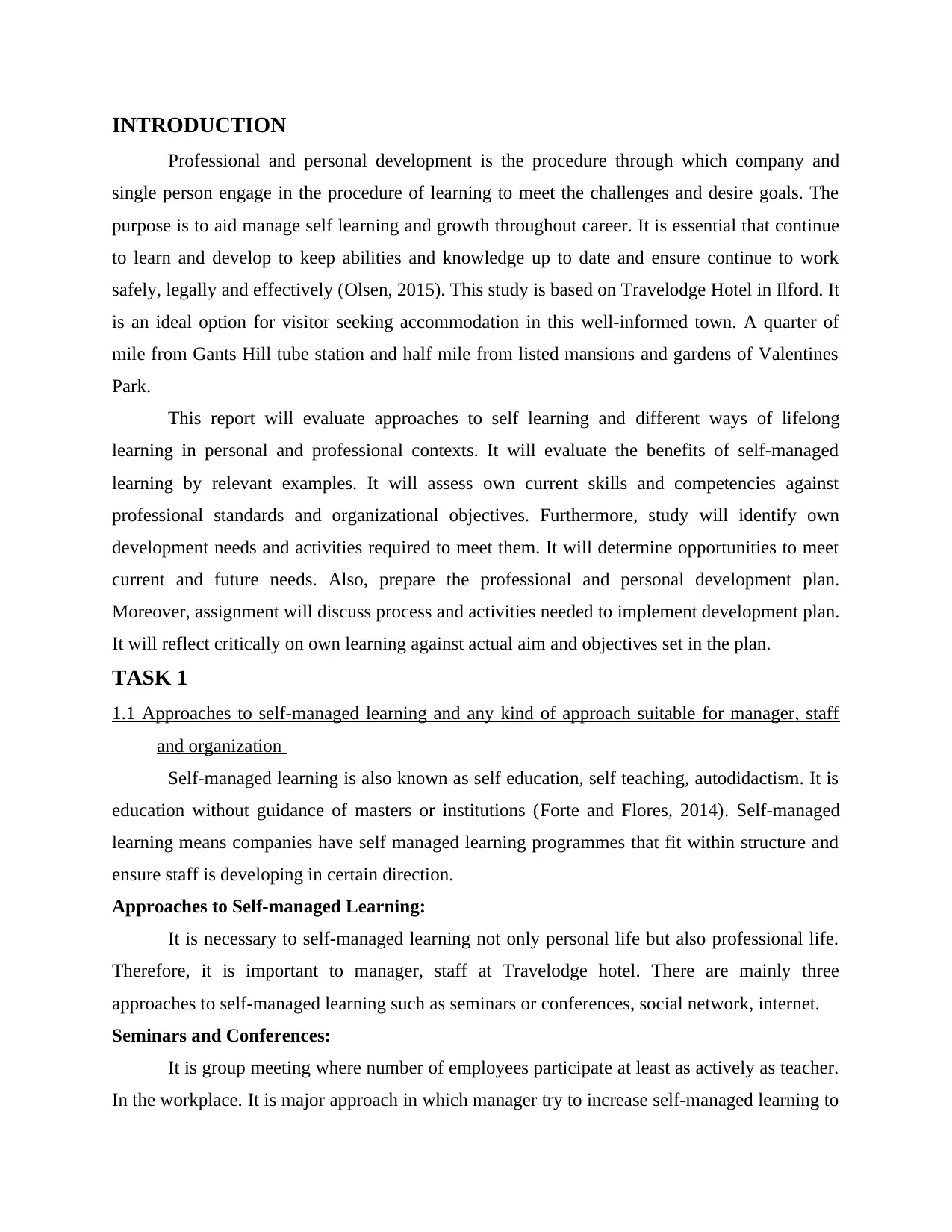
INTRODUCTION
Professional and personal development is the procedure through which company and
single person engage in the procedure of learning to meet the challenges and desire goals. The
purpose is to aid manage self learning and growth throughout career. It is essential that continue
to learn and develop to keep abilities and knowledge up to date and ensure continue to work
safely, legally and effectively (Olsen, 2015). This study is based on Travelodge Hotel in Ilford. It
is an ideal option for visitor seeking accommodation in this well-informed town. A quarter of
mile from Gants Hill tube station and half mile from listed mansions and gardens of Valentines
Park.
This report will evaluate approaches to self learning and different ways of lifelong
learning in personal and professional contexts. It will evaluate the benefits of self-managed
learning by relevant examples. It will assess own current skills and competencies against
professional standards and organizational objectives. Furthermore, study will identify own
development needs and activities required to meet them. It will determine opportunities to meet
current and future needs. Also, prepare the professional and personal development plan.
Moreover, assignment will discuss process and activities needed to implement development plan.
It will reflect critically on own learning against actual aim and objectives set in the plan.
TASK 1
1.1 Approaches to self-managed learning and any kind of approach suitable for manager, staff
and organization
Self-managed learning is also known as self education, self teaching, autodidactism. It is
education without guidance of masters or institutions (Forte and Flores, 2014). Self-managed
learning means companies have self managed learning programmes that fit within structure and
ensure staff is developing in certain direction.
Approaches to Self-managed Learning:
It is necessary to self-managed learning not only personal life but also professional life.
Therefore, it is important to manager, staff at Travelodge hotel. There are mainly three
approaches to self-managed learning such as seminars or conferences, social network, internet.
Seminars and Conferences:
It is group meeting where number of employees participate at least as actively as teacher.
In the workplace. It is major approach in which manager try to increase self-managed learning to
Professional and personal development is the procedure through which company and
single person engage in the procedure of learning to meet the challenges and desire goals. The
purpose is to aid manage self learning and growth throughout career. It is essential that continue
to learn and develop to keep abilities and knowledge up to date and ensure continue to work
safely, legally and effectively (Olsen, 2015). This study is based on Travelodge Hotel in Ilford. It
is an ideal option for visitor seeking accommodation in this well-informed town. A quarter of
mile from Gants Hill tube station and half mile from listed mansions and gardens of Valentines
Park.
This report will evaluate approaches to self learning and different ways of lifelong
learning in personal and professional contexts. It will evaluate the benefits of self-managed
learning by relevant examples. It will assess own current skills and competencies against
professional standards and organizational objectives. Furthermore, study will identify own
development needs and activities required to meet them. It will determine opportunities to meet
current and future needs. Also, prepare the professional and personal development plan.
Moreover, assignment will discuss process and activities needed to implement development plan.
It will reflect critically on own learning against actual aim and objectives set in the plan.
TASK 1
1.1 Approaches to self-managed learning and any kind of approach suitable for manager, staff
and organization
Self-managed learning is also known as self education, self teaching, autodidactism. It is
education without guidance of masters or institutions (Forte and Flores, 2014). Self-managed
learning means companies have self managed learning programmes that fit within structure and
ensure staff is developing in certain direction.
Approaches to Self-managed Learning:
It is necessary to self-managed learning not only personal life but also professional life.
Therefore, it is important to manager, staff at Travelodge hotel. There are mainly three
approaches to self-managed learning such as seminars or conferences, social network, internet.
Seminars and Conferences:
It is group meeting where number of employees participate at least as actively as teacher.
In the workplace. It is major approach in which manager try to increase self-managed learning to
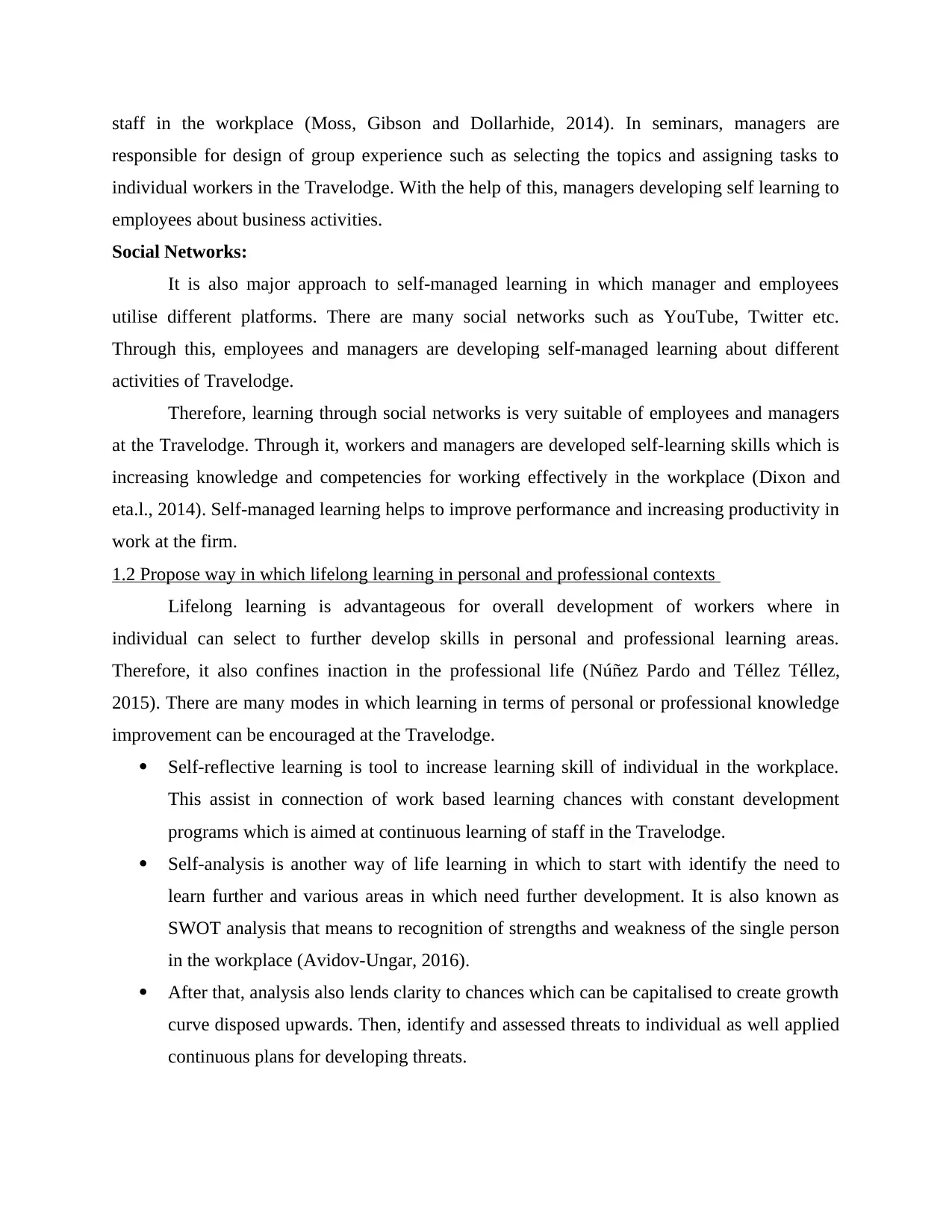
staff in the workplace (Moss, Gibson and Dollarhide, 2014). In seminars, managers are
responsible for design of group experience such as selecting the topics and assigning tasks to
individual workers in the Travelodge. With the help of this, managers developing self learning to
employees about business activities.
Social Networks:
It is also major approach to self-managed learning in which manager and employees
utilise different platforms. There are many social networks such as YouTube, Twitter etc.
Through this, employees and managers are developing self-managed learning about different
activities of Travelodge.
Therefore, learning through social networks is very suitable of employees and managers
at the Travelodge. Through it, workers and managers are developed self-learning skills which is
increasing knowledge and competencies for working effectively in the workplace (Dixon and
eta.l., 2014). Self-managed learning helps to improve performance and increasing productivity in
work at the firm.
1.2 Propose way in which lifelong learning in personal and professional contexts
Lifelong learning is advantageous for overall development of workers where in
individual can select to further develop skills in personal and professional learning areas.
Therefore, it also confines inaction in the professional life (Núñez Pardo and Téllez Téllez,
2015). There are many modes in which learning in terms of personal or professional knowledge
improvement can be encouraged at the Travelodge.
Self-reflective learning is tool to increase learning skill of individual in the workplace.
This assist in connection of work based learning chances with constant development
programs which is aimed at continuous learning of staff in the Travelodge.
Self-analysis is another way of life learning in which to start with identify the need to
learn further and various areas in which need further development. It is also known as
SWOT analysis that means to recognition of strengths and weakness of the single person
in the workplace (Avidov-Ungar, 2016).
After that, analysis also lends clarity to chances which can be capitalised to create growth
curve disposed upwards. Then, identify and assessed threats to individual as well applied
continuous plans for developing threats.
responsible for design of group experience such as selecting the topics and assigning tasks to
individual workers in the Travelodge. With the help of this, managers developing self learning to
employees about business activities.
Social Networks:
It is also major approach to self-managed learning in which manager and employees
utilise different platforms. There are many social networks such as YouTube, Twitter etc.
Through this, employees and managers are developing self-managed learning about different
activities of Travelodge.
Therefore, learning through social networks is very suitable of employees and managers
at the Travelodge. Through it, workers and managers are developed self-learning skills which is
increasing knowledge and competencies for working effectively in the workplace (Dixon and
eta.l., 2014). Self-managed learning helps to improve performance and increasing productivity in
work at the firm.
1.2 Propose way in which lifelong learning in personal and professional contexts
Lifelong learning is advantageous for overall development of workers where in
individual can select to further develop skills in personal and professional learning areas.
Therefore, it also confines inaction in the professional life (Núñez Pardo and Téllez Téllez,
2015). There are many modes in which learning in terms of personal or professional knowledge
improvement can be encouraged at the Travelodge.
Self-reflective learning is tool to increase learning skill of individual in the workplace.
This assist in connection of work based learning chances with constant development
programs which is aimed at continuous learning of staff in the Travelodge.
Self-analysis is another way of life learning in which to start with identify the need to
learn further and various areas in which need further development. It is also known as
SWOT analysis that means to recognition of strengths and weakness of the single person
in the workplace (Avidov-Ungar, 2016).
After that, analysis also lends clarity to chances which can be capitalised to create growth
curve disposed upwards. Then, identify and assessed threats to individual as well applied
continuous plans for developing threats.
Secure Best Marks with AI Grader
Need help grading? Try our AI Grader for instant feedback on your assignments.
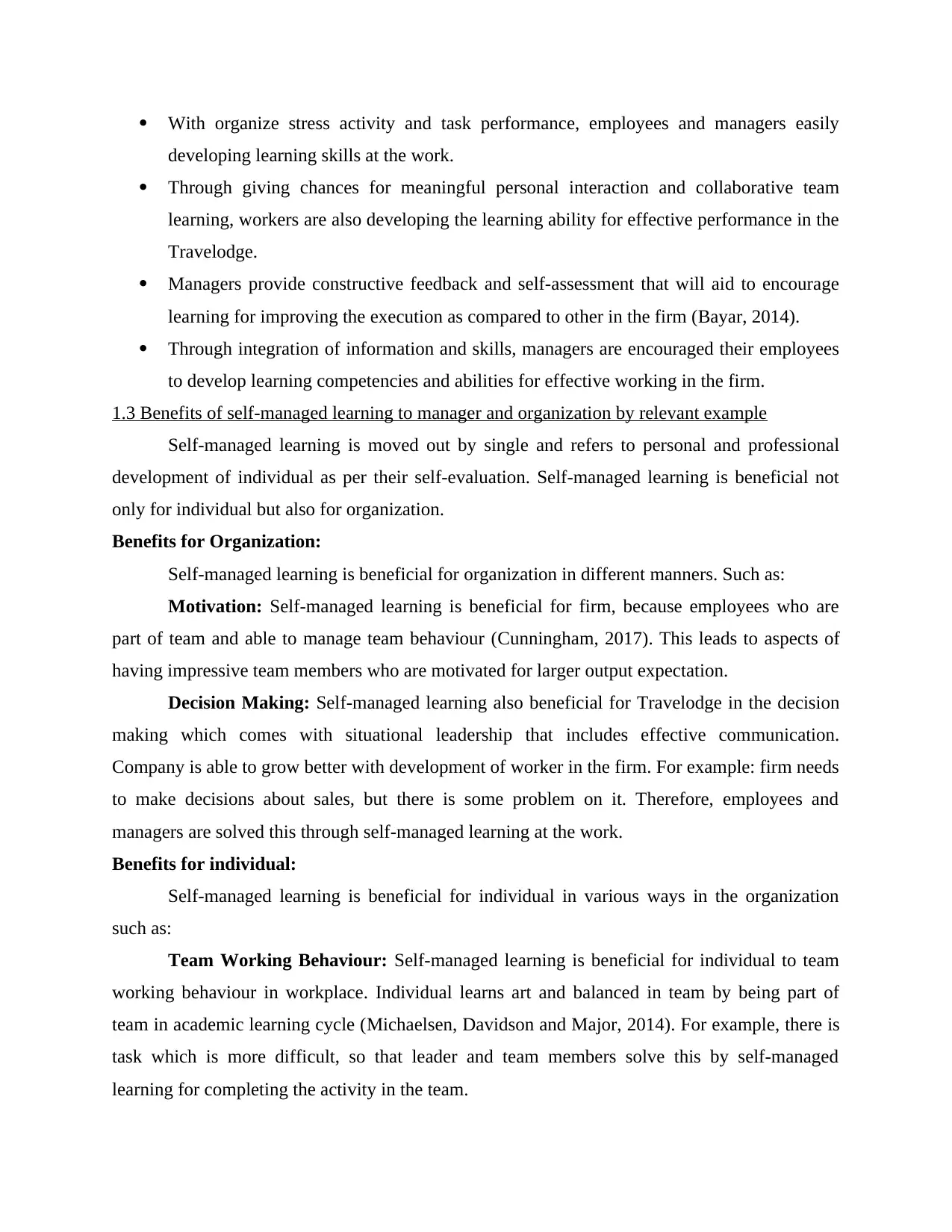
With organize stress activity and task performance, employees and managers easily
developing learning skills at the work.
Through giving chances for meaningful personal interaction and collaborative team
learning, workers are also developing the learning ability for effective performance in the
Travelodge.
Managers provide constructive feedback and self-assessment that will aid to encourage
learning for improving the execution as compared to other in the firm (Bayar, 2014).
Through integration of information and skills, managers are encouraged their employees
to develop learning competencies and abilities for effective working in the firm.
1.3 Benefits of self-managed learning to manager and organization by relevant example
Self-managed learning is moved out by single and refers to personal and professional
development of individual as per their self-evaluation. Self-managed learning is beneficial not
only for individual but also for organization.
Benefits for Organization:
Self-managed learning is beneficial for organization in different manners. Such as:
Motivation: Self-managed learning is beneficial for firm, because employees who are
part of team and able to manage team behaviour (Cunningham, 2017). This leads to aspects of
having impressive team members who are motivated for larger output expectation.
Decision Making: Self-managed learning also beneficial for Travelodge in the decision
making which comes with situational leadership that includes effective communication.
Company is able to grow better with development of worker in the firm. For example: firm needs
to make decisions about sales, but there is some problem on it. Therefore, employees and
managers are solved this through self-managed learning at the work.
Benefits for individual:
Self-managed learning is beneficial for individual in various ways in the organization
such as:
Team Working Behaviour: Self-managed learning is beneficial for individual to team
working behaviour in workplace. Individual learns art and balanced in team by being part of
team in academic learning cycle (Michaelsen, Davidson and Major, 2014). For example, there is
task which is more difficult, so that leader and team members solve this by self-managed
learning for completing the activity in the team.
developing learning skills at the work.
Through giving chances for meaningful personal interaction and collaborative team
learning, workers are also developing the learning ability for effective performance in the
Travelodge.
Managers provide constructive feedback and self-assessment that will aid to encourage
learning for improving the execution as compared to other in the firm (Bayar, 2014).
Through integration of information and skills, managers are encouraged their employees
to develop learning competencies and abilities for effective working in the firm.
1.3 Benefits of self-managed learning to manager and organization by relevant example
Self-managed learning is moved out by single and refers to personal and professional
development of individual as per their self-evaluation. Self-managed learning is beneficial not
only for individual but also for organization.
Benefits for Organization:
Self-managed learning is beneficial for organization in different manners. Such as:
Motivation: Self-managed learning is beneficial for firm, because employees who are
part of team and able to manage team behaviour (Cunningham, 2017). This leads to aspects of
having impressive team members who are motivated for larger output expectation.
Decision Making: Self-managed learning also beneficial for Travelodge in the decision
making which comes with situational leadership that includes effective communication.
Company is able to grow better with development of worker in the firm. For example: firm needs
to make decisions about sales, but there is some problem on it. Therefore, employees and
managers are solved this through self-managed learning at the work.
Benefits for individual:
Self-managed learning is beneficial for individual in various ways in the organization
such as:
Team Working Behaviour: Self-managed learning is beneficial for individual to team
working behaviour in workplace. Individual learns art and balanced in team by being part of
team in academic learning cycle (Michaelsen, Davidson and Major, 2014). For example, there is
task which is more difficult, so that leader and team members solve this by self-managed
learning for completing the activity in the team.
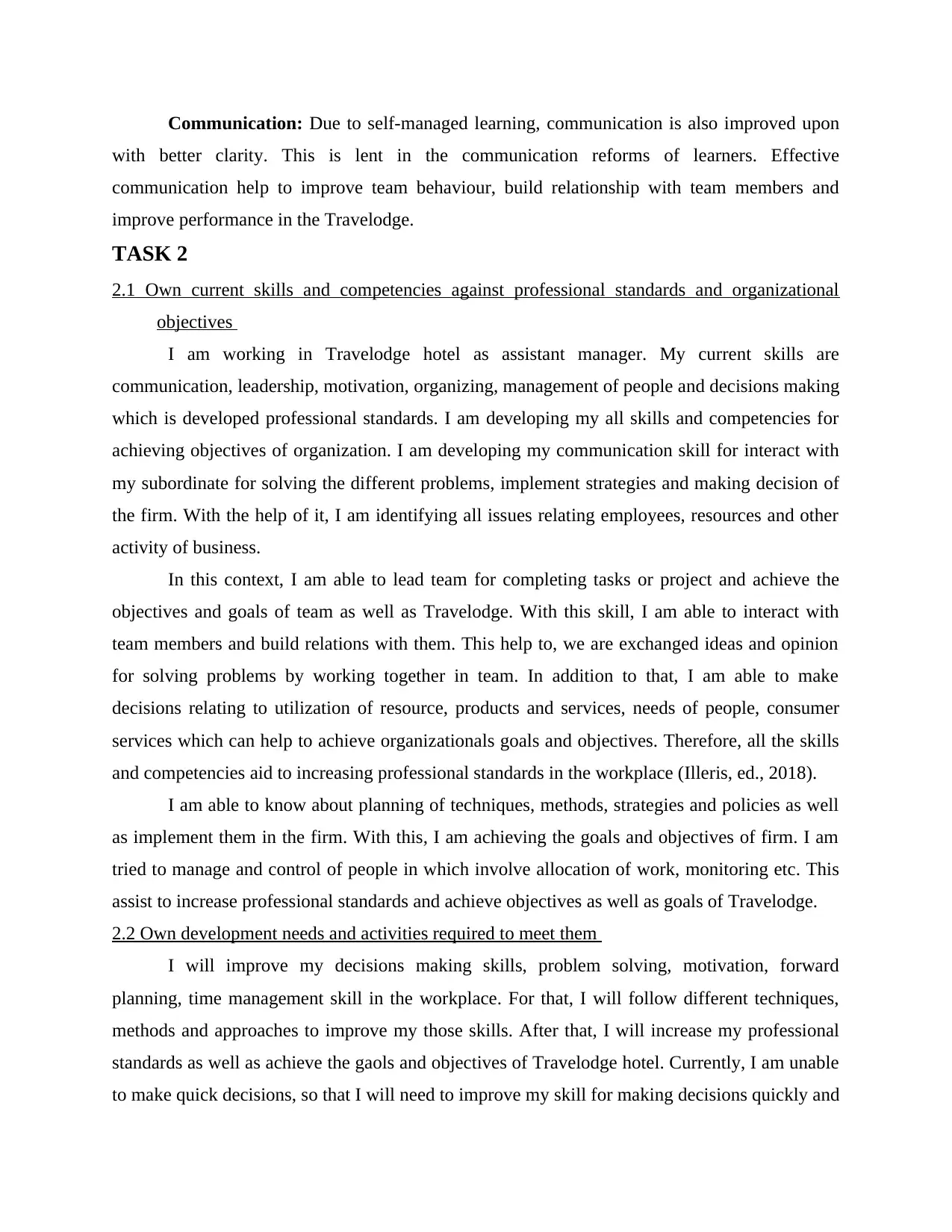
Communication: Due to self-managed learning, communication is also improved upon
with better clarity. This is lent in the communication reforms of learners. Effective
communication help to improve team behaviour, build relationship with team members and
improve performance in the Travelodge.
TASK 2
2.1 Own current skills and competencies against professional standards and organizational
objectives
I am working in Travelodge hotel as assistant manager. My current skills are
communication, leadership, motivation, organizing, management of people and decisions making
which is developed professional standards. I am developing my all skills and competencies for
achieving objectives of organization. I am developing my communication skill for interact with
my subordinate for solving the different problems, implement strategies and making decision of
the firm. With the help of it, I am identifying all issues relating employees, resources and other
activity of business.
In this context, I am able to lead team for completing tasks or project and achieve the
objectives and goals of team as well as Travelodge. With this skill, I am able to interact with
team members and build relations with them. This help to, we are exchanged ideas and opinion
for solving problems by working together in team. In addition to that, I am able to make
decisions relating to utilization of resource, products and services, needs of people, consumer
services which can help to achieve organizationals goals and objectives. Therefore, all the skills
and competencies aid to increasing professional standards in the workplace (Illeris, ed., 2018).
I am able to know about planning of techniques, methods, strategies and policies as well
as implement them in the firm. With this, I am achieving the goals and objectives of firm. I am
tried to manage and control of people in which involve allocation of work, monitoring etc. This
assist to increase professional standards and achieve objectives as well as goals of Travelodge.
2.2 Own development needs and activities required to meet them
I will improve my decisions making skills, problem solving, motivation, forward
planning, time management skill in the workplace. For that, I will follow different techniques,
methods and approaches to improve my those skills. After that, I will increase my professional
standards as well as achieve the gaols and objectives of Travelodge hotel. Currently, I am unable
to make quick decisions, so that I will need to improve my skill for making decisions quickly and
with better clarity. This is lent in the communication reforms of learners. Effective
communication help to improve team behaviour, build relationship with team members and
improve performance in the Travelodge.
TASK 2
2.1 Own current skills and competencies against professional standards and organizational
objectives
I am working in Travelodge hotel as assistant manager. My current skills are
communication, leadership, motivation, organizing, management of people and decisions making
which is developed professional standards. I am developing my all skills and competencies for
achieving objectives of organization. I am developing my communication skill for interact with
my subordinate for solving the different problems, implement strategies and making decision of
the firm. With the help of it, I am identifying all issues relating employees, resources and other
activity of business.
In this context, I am able to lead team for completing tasks or project and achieve the
objectives and goals of team as well as Travelodge. With this skill, I am able to interact with
team members and build relations with them. This help to, we are exchanged ideas and opinion
for solving problems by working together in team. In addition to that, I am able to make
decisions relating to utilization of resource, products and services, needs of people, consumer
services which can help to achieve organizationals goals and objectives. Therefore, all the skills
and competencies aid to increasing professional standards in the workplace (Illeris, ed., 2018).
I am able to know about planning of techniques, methods, strategies and policies as well
as implement them in the firm. With this, I am achieving the goals and objectives of firm. I am
tried to manage and control of people in which involve allocation of work, monitoring etc. This
assist to increase professional standards and achieve objectives as well as goals of Travelodge.
2.2 Own development needs and activities required to meet them
I will improve my decisions making skills, problem solving, motivation, forward
planning, time management skill in the workplace. For that, I will follow different techniques,
methods and approaches to improve my those skills. After that, I will increase my professional
standards as well as achieve the gaols and objectives of Travelodge hotel. Currently, I am unable
to make quick decisions, so that I will need to improve my skill for making decisions quickly and
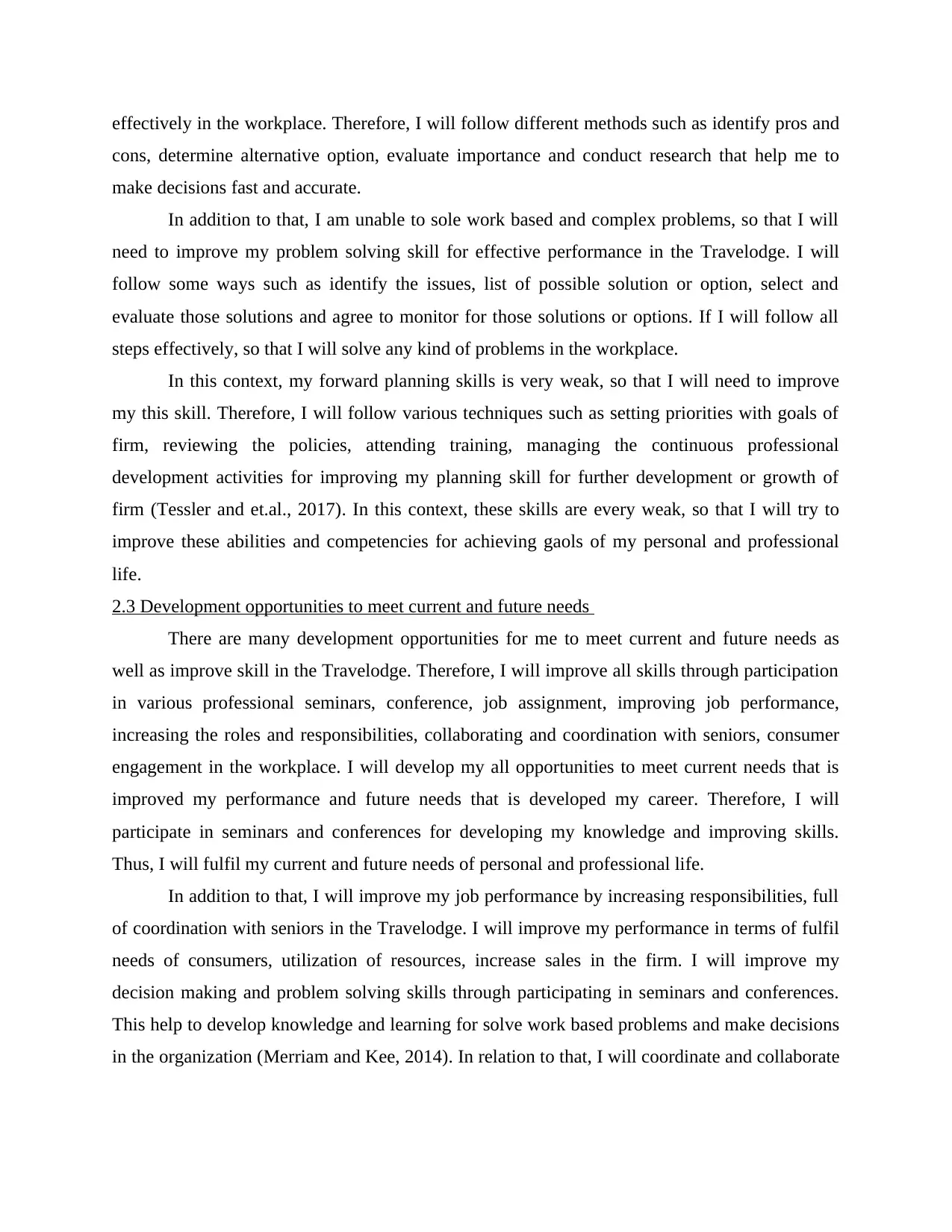
effectively in the workplace. Therefore, I will follow different methods such as identify pros and
cons, determine alternative option, evaluate importance and conduct research that help me to
make decisions fast and accurate.
In addition to that, I am unable to sole work based and complex problems, so that I will
need to improve my problem solving skill for effective performance in the Travelodge. I will
follow some ways such as identify the issues, list of possible solution or option, select and
evaluate those solutions and agree to monitor for those solutions or options. If I will follow all
steps effectively, so that I will solve any kind of problems in the workplace.
In this context, my forward planning skills is very weak, so that I will need to improve
my this skill. Therefore, I will follow various techniques such as setting priorities with goals of
firm, reviewing the policies, attending training, managing the continuous professional
development activities for improving my planning skill for further development or growth of
firm (Tessler and et.al., 2017). In this context, these skills are every weak, so that I will try to
improve these abilities and competencies for achieving gaols of my personal and professional
life.
2.3 Development opportunities to meet current and future needs
There are many development opportunities for me to meet current and future needs as
well as improve skill in the Travelodge. Therefore, I will improve all skills through participation
in various professional seminars, conference, job assignment, improving job performance,
increasing the roles and responsibilities, collaborating and coordination with seniors, consumer
engagement in the workplace. I will develop my all opportunities to meet current needs that is
improved my performance and future needs that is developed my career. Therefore, I will
participate in seminars and conferences for developing my knowledge and improving skills.
Thus, I will fulfil my current and future needs of personal and professional life.
In addition to that, I will improve my job performance by increasing responsibilities, full
of coordination with seniors in the Travelodge. I will improve my performance in terms of fulfil
needs of consumers, utilization of resources, increase sales in the firm. I will improve my
decision making and problem solving skills through participating in seminars and conferences.
This help to develop knowledge and learning for solve work based problems and make decisions
in the organization (Merriam and Kee, 2014). In relation to that, I will coordinate and collaborate
cons, determine alternative option, evaluate importance and conduct research that help me to
make decisions fast and accurate.
In addition to that, I am unable to sole work based and complex problems, so that I will
need to improve my problem solving skill for effective performance in the Travelodge. I will
follow some ways such as identify the issues, list of possible solution or option, select and
evaluate those solutions and agree to monitor for those solutions or options. If I will follow all
steps effectively, so that I will solve any kind of problems in the workplace.
In this context, my forward planning skills is very weak, so that I will need to improve
my this skill. Therefore, I will follow various techniques such as setting priorities with goals of
firm, reviewing the policies, attending training, managing the continuous professional
development activities for improving my planning skill for further development or growth of
firm (Tessler and et.al., 2017). In this context, these skills are every weak, so that I will try to
improve these abilities and competencies for achieving gaols of my personal and professional
life.
2.3 Development opportunities to meet current and future needs
There are many development opportunities for me to meet current and future needs as
well as improve skill in the Travelodge. Therefore, I will improve all skills through participation
in various professional seminars, conference, job assignment, improving job performance,
increasing the roles and responsibilities, collaborating and coordination with seniors, consumer
engagement in the workplace. I will develop my all opportunities to meet current needs that is
improved my performance and future needs that is developed my career. Therefore, I will
participate in seminars and conferences for developing my knowledge and improving skills.
Thus, I will fulfil my current and future needs of personal and professional life.
In addition to that, I will improve my job performance by increasing responsibilities, full
of coordination with seniors in the Travelodge. I will improve my performance in terms of fulfil
needs of consumers, utilization of resources, increase sales in the firm. I will improve my
decision making and problem solving skills through participating in seminars and conferences.
This help to develop knowledge and learning for solve work based problems and make decisions
in the organization (Merriam and Kee, 2014). In relation to that, I will coordinate and collaborate
Paraphrase This Document
Need a fresh take? Get an instant paraphrase of this document with our AI Paraphraser
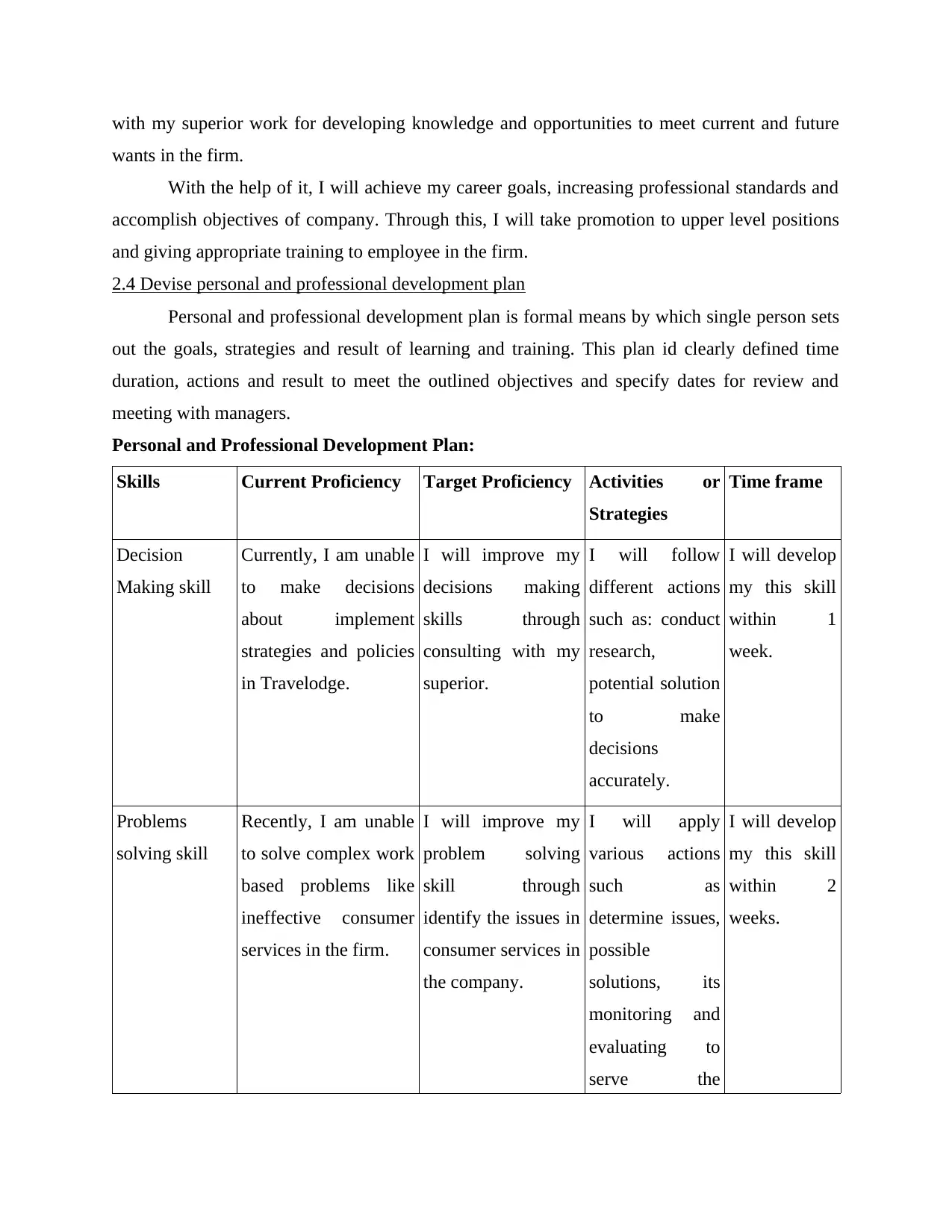
with my superior work for developing knowledge and opportunities to meet current and future
wants in the firm.
With the help of it, I will achieve my career goals, increasing professional standards and
accomplish objectives of company. Through this, I will take promotion to upper level positions
and giving appropriate training to employee in the firm.
2.4 Devise personal and professional development plan
Personal and professional development plan is formal means by which single person sets
out the goals, strategies and result of learning and training. This plan id clearly defined time
duration, actions and result to meet the outlined objectives and specify dates for review and
meeting with managers.
Personal and Professional Development Plan:
Skills Current Proficiency Target Proficiency Activities or
Strategies
Time frame
Decision
Making skill
Currently, I am unable
to make decisions
about implement
strategies and policies
in Travelodge.
I will improve my
decisions making
skills through
consulting with my
superior.
I will follow
different actions
such as: conduct
research,
potential solution
to make
decisions
accurately.
I will develop
my this skill
within 1
week.
Problems
solving skill
Recently, I am unable
to solve complex work
based problems like
ineffective consumer
services in the firm.
I will improve my
problem solving
skill through
identify the issues in
consumer services in
the company.
I will apply
various actions
such as
determine issues,
possible
solutions, its
monitoring and
evaluating to
serve the
I will develop
my this skill
within 2
weeks.
wants in the firm.
With the help of it, I will achieve my career goals, increasing professional standards and
accomplish objectives of company. Through this, I will take promotion to upper level positions
and giving appropriate training to employee in the firm.
2.4 Devise personal and professional development plan
Personal and professional development plan is formal means by which single person sets
out the goals, strategies and result of learning and training. This plan id clearly defined time
duration, actions and result to meet the outlined objectives and specify dates for review and
meeting with managers.
Personal and Professional Development Plan:
Skills Current Proficiency Target Proficiency Activities or
Strategies
Time frame
Decision
Making skill
Currently, I am unable
to make decisions
about implement
strategies and policies
in Travelodge.
I will improve my
decisions making
skills through
consulting with my
superior.
I will follow
different actions
such as: conduct
research,
potential solution
to make
decisions
accurately.
I will develop
my this skill
within 1
week.
Problems
solving skill
Recently, I am unable
to solve complex work
based problems like
ineffective consumer
services in the firm.
I will improve my
problem solving
skill through
identify the issues in
consumer services in
the company.
I will apply
various actions
such as
determine issues,
possible
solutions, its
monitoring and
evaluating to
serve the
I will develop
my this skill
within 2
weeks.
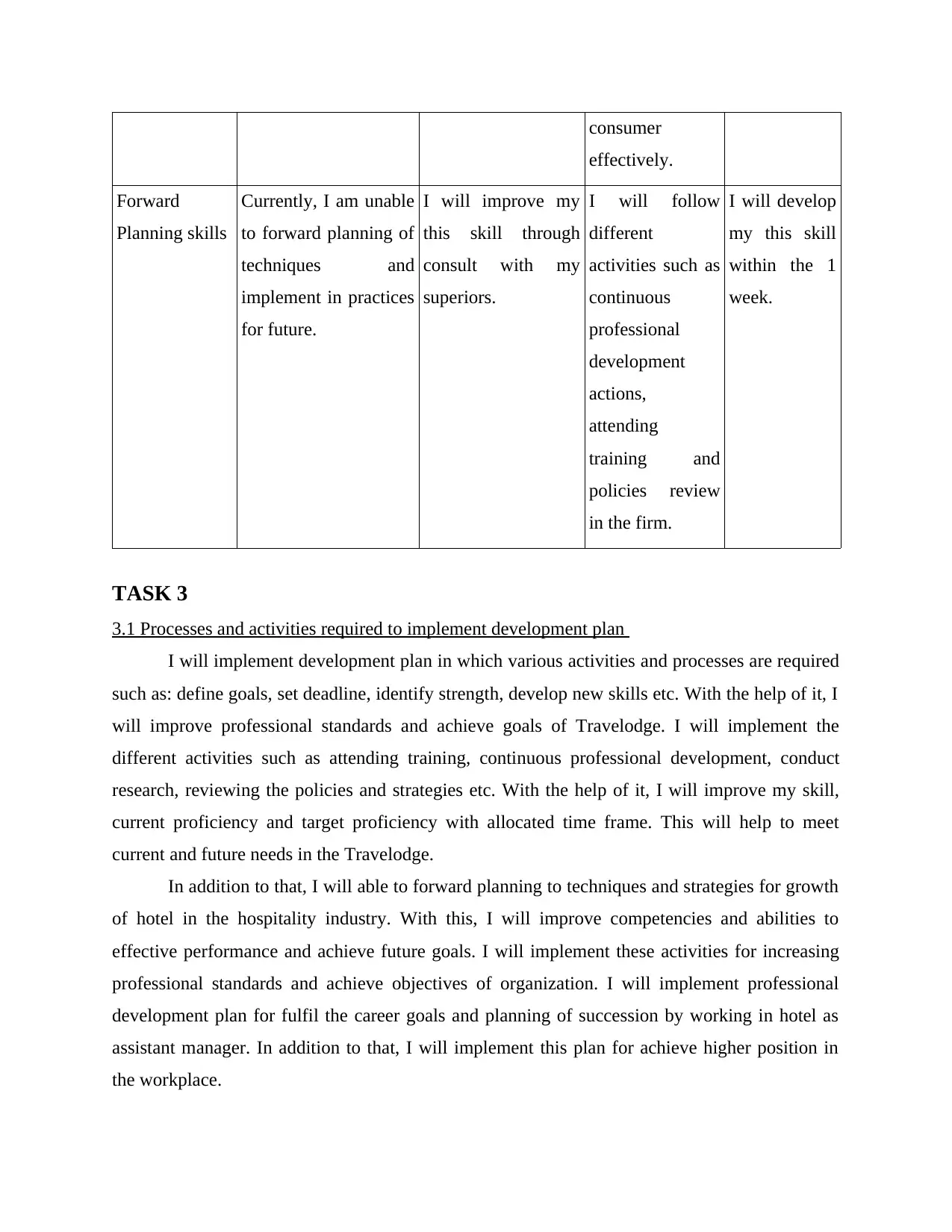
consumer
effectively.
Forward
Planning skills
Currently, I am unable
to forward planning of
techniques and
implement in practices
for future.
I will improve my
this skill through
consult with my
superiors.
I will follow
different
activities such as
continuous
professional
development
actions,
attending
training and
policies review
in the firm.
I will develop
my this skill
within the 1
week.
TASK 3
3.1 Processes and activities required to implement development plan
I will implement development plan in which various activities and processes are required
such as: define goals, set deadline, identify strength, develop new skills etc. With the help of it, I
will improve professional standards and achieve goals of Travelodge. I will implement the
different activities such as attending training, continuous professional development, conduct
research, reviewing the policies and strategies etc. With the help of it, I will improve my skill,
current proficiency and target proficiency with allocated time frame. This will help to meet
current and future needs in the Travelodge.
In addition to that, I will able to forward planning to techniques and strategies for growth
of hotel in the hospitality industry. With this, I will improve competencies and abilities to
effective performance and achieve future goals. I will implement these activities for increasing
professional standards and achieve objectives of organization. I will implement professional
development plan for fulfil the career goals and planning of succession by working in hotel as
assistant manager. In addition to that, I will implement this plan for achieve higher position in
the workplace.
effectively.
Forward
Planning skills
Currently, I am unable
to forward planning of
techniques and
implement in practices
for future.
I will improve my
this skill through
consult with my
superiors.
I will follow
different
activities such as
continuous
professional
development
actions,
attending
training and
policies review
in the firm.
I will develop
my this skill
within the 1
week.
TASK 3
3.1 Processes and activities required to implement development plan
I will implement development plan in which various activities and processes are required
such as: define goals, set deadline, identify strength, develop new skills etc. With the help of it, I
will improve professional standards and achieve goals of Travelodge. I will implement the
different activities such as attending training, continuous professional development, conduct
research, reviewing the policies and strategies etc. With the help of it, I will improve my skill,
current proficiency and target proficiency with allocated time frame. This will help to meet
current and future needs in the Travelodge.
In addition to that, I will able to forward planning to techniques and strategies for growth
of hotel in the hospitality industry. With this, I will improve competencies and abilities to
effective performance and achieve future goals. I will implement these activities for increasing
professional standards and achieve objectives of organization. I will implement professional
development plan for fulfil the career goals and planning of succession by working in hotel as
assistant manager. In addition to that, I will implement this plan for achieve higher position in
the workplace.
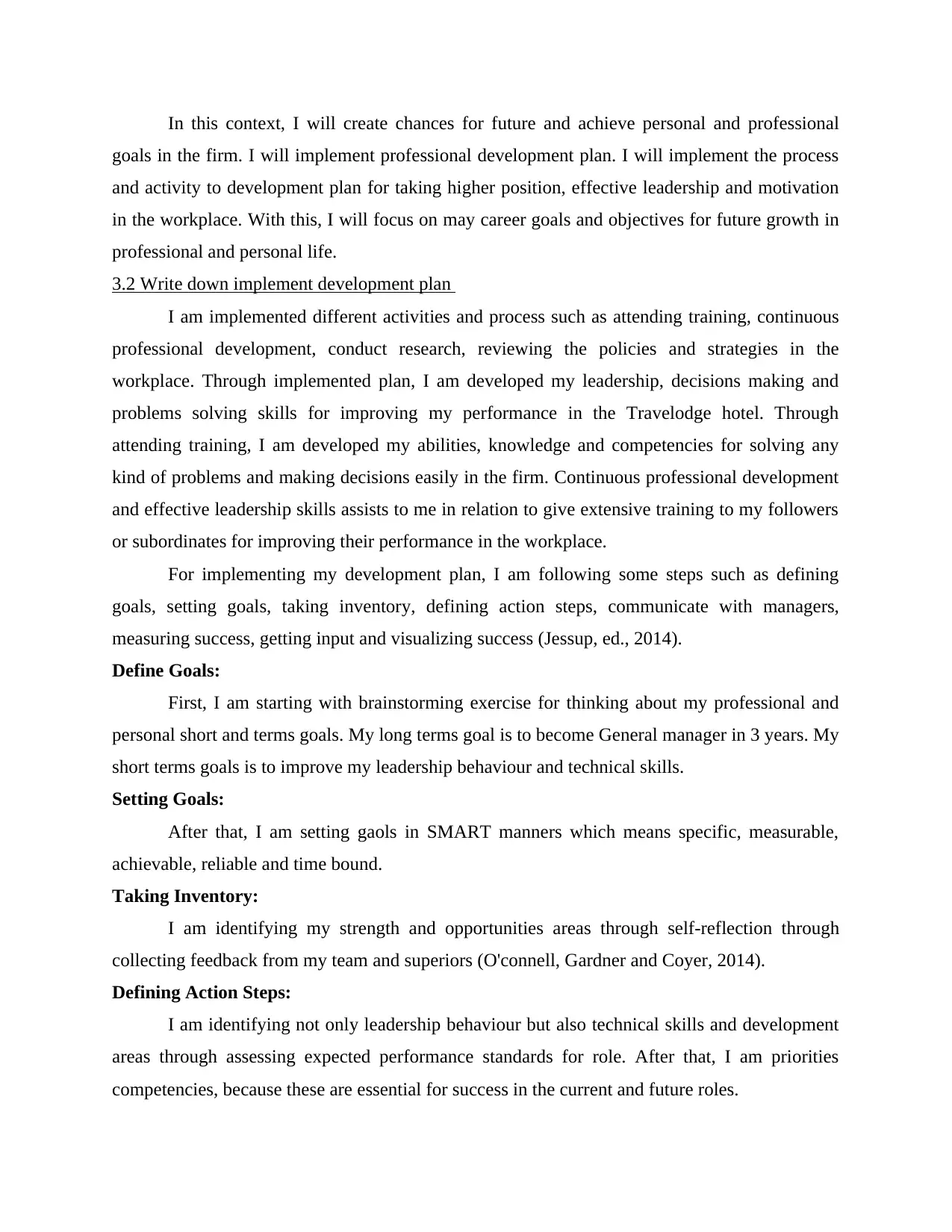
In this context, I will create chances for future and achieve personal and professional
goals in the firm. I will implement professional development plan. I will implement the process
and activity to development plan for taking higher position, effective leadership and motivation
in the workplace. With this, I will focus on may career goals and objectives for future growth in
professional and personal life.
3.2 Write down implement development plan
I am implemented different activities and process such as attending training, continuous
professional development, conduct research, reviewing the policies and strategies in the
workplace. Through implemented plan, I am developed my leadership, decisions making and
problems solving skills for improving my performance in the Travelodge hotel. Through
attending training, I am developed my abilities, knowledge and competencies for solving any
kind of problems and making decisions easily in the firm. Continuous professional development
and effective leadership skills assists to me in relation to give extensive training to my followers
or subordinates for improving their performance in the workplace.
For implementing my development plan, I am following some steps such as defining
goals, setting goals, taking inventory, defining action steps, communicate with managers,
measuring success, getting input and visualizing success (Jessup, ed., 2014).
Define Goals:
First, I am starting with brainstorming exercise for thinking about my professional and
personal short and terms goals. My long terms goal is to become General manager in 3 years. My
short terms goals is to improve my leadership behaviour and technical skills.
Setting Goals:
After that, I am setting gaols in SMART manners which means specific, measurable,
achievable, reliable and time bound.
Taking Inventory:
I am identifying my strength and opportunities areas through self-reflection through
collecting feedback from my team and superiors (O'connell, Gardner and Coyer, 2014).
Defining Action Steps:
I am identifying not only leadership behaviour but also technical skills and development
areas through assessing expected performance standards for role. After that, I am priorities
competencies, because these are essential for success in the current and future roles.
goals in the firm. I will implement professional development plan. I will implement the process
and activity to development plan for taking higher position, effective leadership and motivation
in the workplace. With this, I will focus on may career goals and objectives for future growth in
professional and personal life.
3.2 Write down implement development plan
I am implemented different activities and process such as attending training, continuous
professional development, conduct research, reviewing the policies and strategies in the
workplace. Through implemented plan, I am developed my leadership, decisions making and
problems solving skills for improving my performance in the Travelodge hotel. Through
attending training, I am developed my abilities, knowledge and competencies for solving any
kind of problems and making decisions easily in the firm. Continuous professional development
and effective leadership skills assists to me in relation to give extensive training to my followers
or subordinates for improving their performance in the workplace.
For implementing my development plan, I am following some steps such as defining
goals, setting goals, taking inventory, defining action steps, communicate with managers,
measuring success, getting input and visualizing success (Jessup, ed., 2014).
Define Goals:
First, I am starting with brainstorming exercise for thinking about my professional and
personal short and terms goals. My long terms goal is to become General manager in 3 years. My
short terms goals is to improve my leadership behaviour and technical skills.
Setting Goals:
After that, I am setting gaols in SMART manners which means specific, measurable,
achievable, reliable and time bound.
Taking Inventory:
I am identifying my strength and opportunities areas through self-reflection through
collecting feedback from my team and superiors (O'connell, Gardner and Coyer, 2014).
Defining Action Steps:
I am identifying not only leadership behaviour but also technical skills and development
areas through assessing expected performance standards for role. After that, I am priorities
competencies, because these are essential for success in the current and future roles.
Secure Best Marks with AI Grader
Need help grading? Try our AI Grader for instant feedback on your assignments.
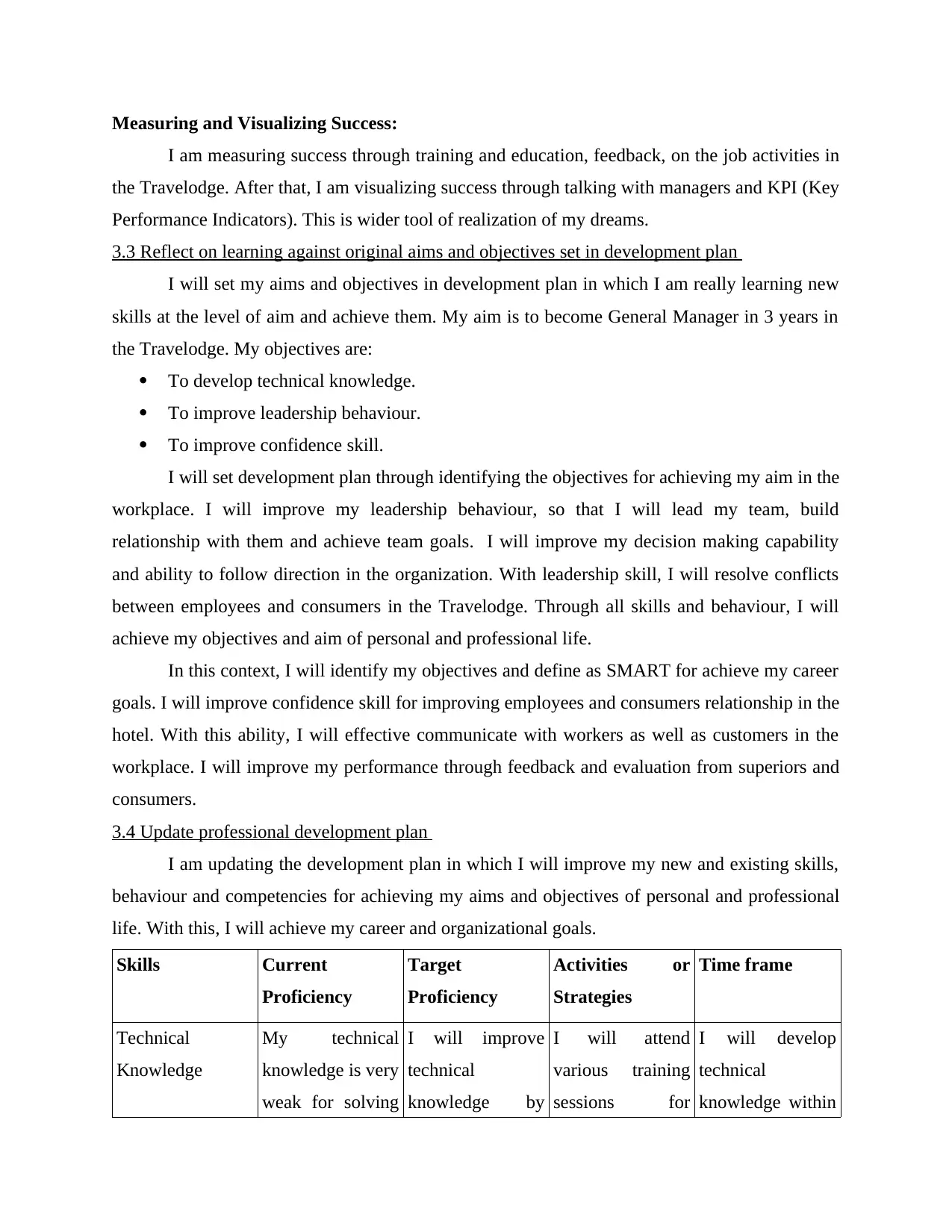
Measuring and Visualizing Success:
I am measuring success through training and education, feedback, on the job activities in
the Travelodge. After that, I am visualizing success through talking with managers and KPI (Key
Performance Indicators). This is wider tool of realization of my dreams.
3.3 Reflect on learning against original aims and objectives set in development plan
I will set my aims and objectives in development plan in which I am really learning new
skills at the level of aim and achieve them. My aim is to become General Manager in 3 years in
the Travelodge. My objectives are:
To develop technical knowledge.
To improve leadership behaviour.
To improve confidence skill.
I will set development plan through identifying the objectives for achieving my aim in the
workplace. I will improve my leadership behaviour, so that I will lead my team, build
relationship with them and achieve team goals. I will improve my decision making capability
and ability to follow direction in the organization. With leadership skill, I will resolve conflicts
between employees and consumers in the Travelodge. Through all skills and behaviour, I will
achieve my objectives and aim of personal and professional life.
In this context, I will identify my objectives and define as SMART for achieve my career
goals. I will improve confidence skill for improving employees and consumers relationship in the
hotel. With this ability, I will effective communicate with workers as well as customers in the
workplace. I will improve my performance through feedback and evaluation from superiors and
consumers.
3.4 Update professional development plan
I am updating the development plan in which I will improve my new and existing skills,
behaviour and competencies for achieving my aims and objectives of personal and professional
life. With this, I will achieve my career and organizational goals.
Skills Current
Proficiency
Target
Proficiency
Activities or
Strategies
Time frame
Technical
Knowledge
My technical
knowledge is very
weak for solving
I will improve
technical
knowledge by
I will attend
various training
sessions for
I will develop
technical
knowledge within
I am measuring success through training and education, feedback, on the job activities in
the Travelodge. After that, I am visualizing success through talking with managers and KPI (Key
Performance Indicators). This is wider tool of realization of my dreams.
3.3 Reflect on learning against original aims and objectives set in development plan
I will set my aims and objectives in development plan in which I am really learning new
skills at the level of aim and achieve them. My aim is to become General Manager in 3 years in
the Travelodge. My objectives are:
To develop technical knowledge.
To improve leadership behaviour.
To improve confidence skill.
I will set development plan through identifying the objectives for achieving my aim in the
workplace. I will improve my leadership behaviour, so that I will lead my team, build
relationship with them and achieve team goals. I will improve my decision making capability
and ability to follow direction in the organization. With leadership skill, I will resolve conflicts
between employees and consumers in the Travelodge. Through all skills and behaviour, I will
achieve my objectives and aim of personal and professional life.
In this context, I will identify my objectives and define as SMART for achieve my career
goals. I will improve confidence skill for improving employees and consumers relationship in the
hotel. With this ability, I will effective communicate with workers as well as customers in the
workplace. I will improve my performance through feedback and evaluation from superiors and
consumers.
3.4 Update professional development plan
I am updating the development plan in which I will improve my new and existing skills,
behaviour and competencies for achieving my aims and objectives of personal and professional
life. With this, I will achieve my career and organizational goals.
Skills Current
Proficiency
Target
Proficiency
Activities or
Strategies
Time frame
Technical
Knowledge
My technical
knowledge is very
weak for solving
I will improve
technical
knowledge by
I will attend
various training
sessions for
I will develop
technical
knowledge within
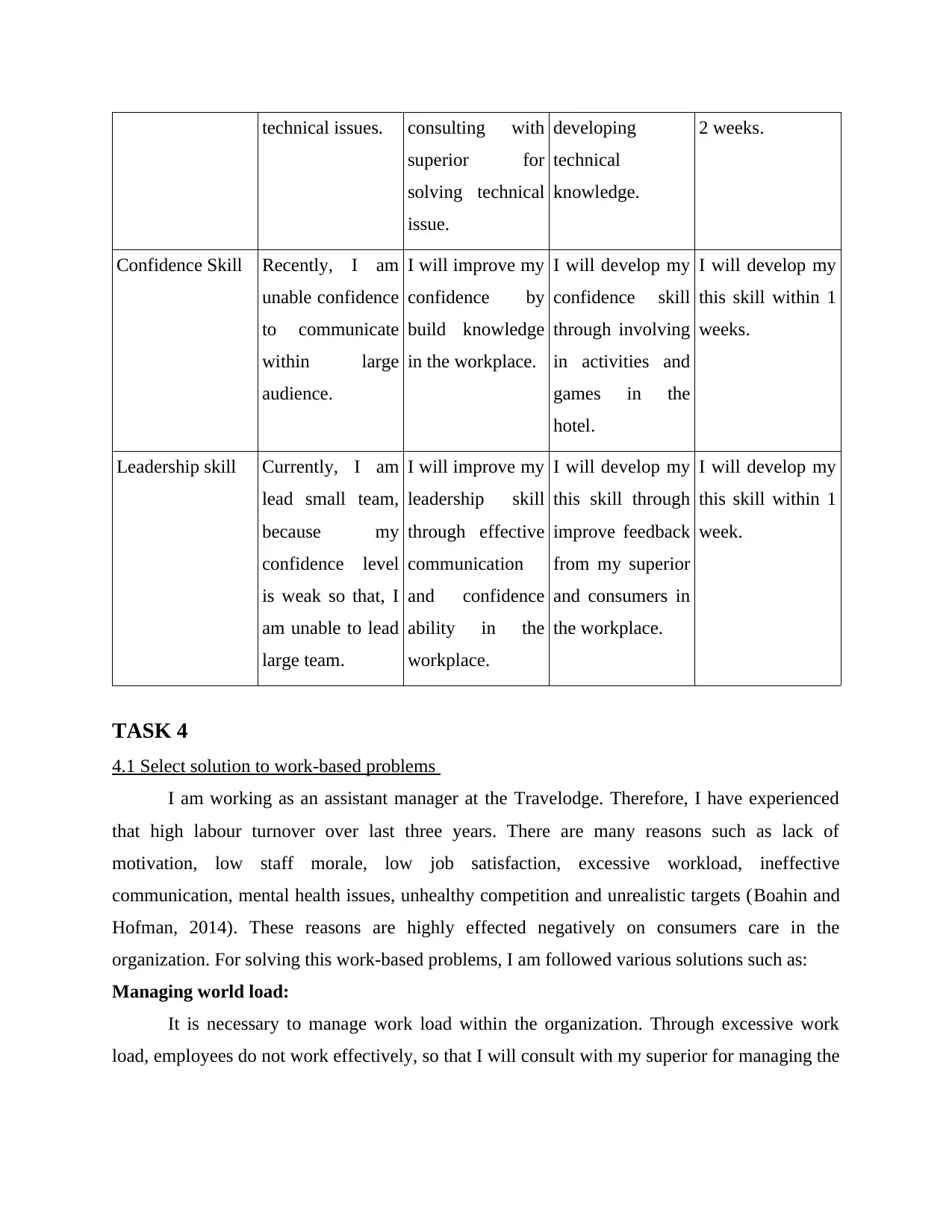
technical issues. consulting with
superior for
solving technical
issue.
developing
technical
knowledge.
2 weeks.
Confidence Skill Recently, I am
unable confidence
to communicate
within large
audience.
I will improve my
confidence by
build knowledge
in the workplace.
I will develop my
confidence skill
through involving
in activities and
games in the
hotel.
I will develop my
this skill within 1
weeks.
Leadership skill Currently, I am
lead small team,
because my
confidence level
is weak so that, I
am unable to lead
large team.
I will improve my
leadership skill
through effective
communication
and confidence
ability in the
workplace.
I will develop my
this skill through
improve feedback
from my superior
and consumers in
the workplace.
I will develop my
this skill within 1
week.
TASK 4
4.1 Select solution to work-based problems
I am working as an assistant manager at the Travelodge. Therefore, I have experienced
that high labour turnover over last three years. There are many reasons such as lack of
motivation, low staff morale, low job satisfaction, excessive workload, ineffective
communication, mental health issues, unhealthy competition and unrealistic targets (Boahin and
Hofman, 2014). These reasons are highly effected negatively on consumers care in the
organization. For solving this work-based problems, I am followed various solutions such as:
Managing world load:
It is necessary to manage work load within the organization. Through excessive work
load, employees do not work effectively, so that I will consult with my superior for managing the
superior for
solving technical
issue.
developing
technical
knowledge.
2 weeks.
Confidence Skill Recently, I am
unable confidence
to communicate
within large
audience.
I will improve my
confidence by
build knowledge
in the workplace.
I will develop my
confidence skill
through involving
in activities and
games in the
hotel.
I will develop my
this skill within 1
weeks.
Leadership skill Currently, I am
lead small team,
because my
confidence level
is weak so that, I
am unable to lead
large team.
I will improve my
leadership skill
through effective
communication
and confidence
ability in the
workplace.
I will develop my
this skill through
improve feedback
from my superior
and consumers in
the workplace.
I will develop my
this skill within 1
week.
TASK 4
4.1 Select solution to work-based problems
I am working as an assistant manager at the Travelodge. Therefore, I have experienced
that high labour turnover over last three years. There are many reasons such as lack of
motivation, low staff morale, low job satisfaction, excessive workload, ineffective
communication, mental health issues, unhealthy competition and unrealistic targets (Boahin and
Hofman, 2014). These reasons are highly effected negatively on consumers care in the
organization. For solving this work-based problems, I am followed various solutions such as:
Managing world load:
It is necessary to manage work load within the organization. Through excessive work
load, employees do not work effectively, so that I will consult with my superior for managing the
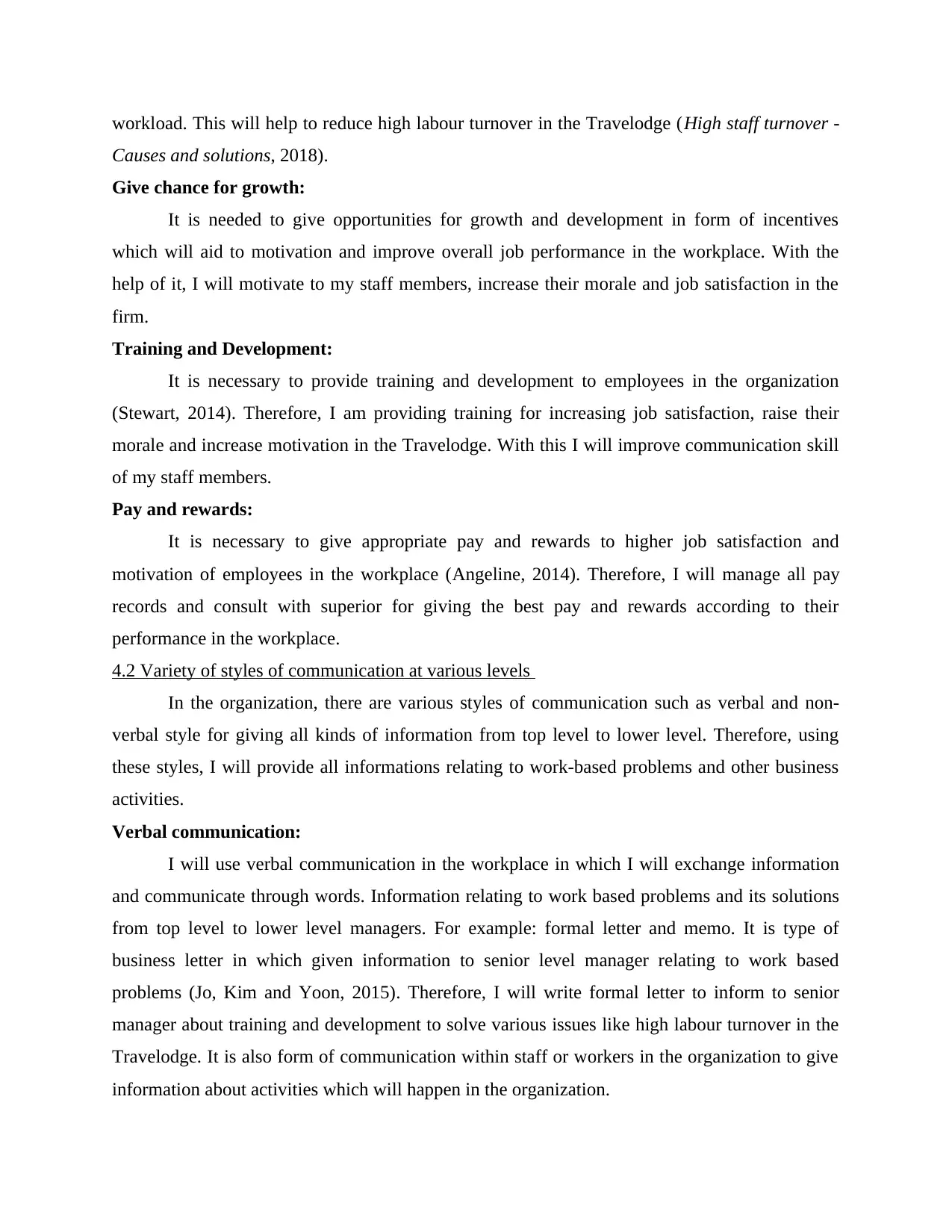
workload. This will help to reduce high labour turnover in the Travelodge (High staff turnover -
Causes and solutions, 2018).
Give chance for growth:
It is needed to give opportunities for growth and development in form of incentives
which will aid to motivation and improve overall job performance in the workplace. With the
help of it, I will motivate to my staff members, increase their morale and job satisfaction in the
firm.
Training and Development:
It is necessary to provide training and development to employees in the organization
(Stewart, 2014). Therefore, I am providing training for increasing job satisfaction, raise their
morale and increase motivation in the Travelodge. With this I will improve communication skill
of my staff members.
Pay and rewards:
It is necessary to give appropriate pay and rewards to higher job satisfaction and
motivation of employees in the workplace (Angeline, 2014). Therefore, I will manage all pay
records and consult with superior for giving the best pay and rewards according to their
performance in the workplace.
4.2 Variety of styles of communication at various levels
In the organization, there are various styles of communication such as verbal and non-
verbal style for giving all kinds of information from top level to lower level. Therefore, using
these styles, I will provide all informations relating to work-based problems and other business
activities.
Verbal communication:
I will use verbal communication in the workplace in which I will exchange information
and communicate through words. Information relating to work based problems and its solutions
from top level to lower level managers. For example: formal letter and memo. It is type of
business letter in which given information to senior level manager relating to work based
problems (Jo, Kim and Yoon, 2015). Therefore, I will write formal letter to inform to senior
manager about training and development to solve various issues like high labour turnover in the
Travelodge. It is also form of communication within staff or workers in the organization to give
information about activities which will happen in the organization.
Causes and solutions, 2018).
Give chance for growth:
It is needed to give opportunities for growth and development in form of incentives
which will aid to motivation and improve overall job performance in the workplace. With the
help of it, I will motivate to my staff members, increase their morale and job satisfaction in the
firm.
Training and Development:
It is necessary to provide training and development to employees in the organization
(Stewart, 2014). Therefore, I am providing training for increasing job satisfaction, raise their
morale and increase motivation in the Travelodge. With this I will improve communication skill
of my staff members.
Pay and rewards:
It is necessary to give appropriate pay and rewards to higher job satisfaction and
motivation of employees in the workplace (Angeline, 2014). Therefore, I will manage all pay
records and consult with superior for giving the best pay and rewards according to their
performance in the workplace.
4.2 Variety of styles of communication at various levels
In the organization, there are various styles of communication such as verbal and non-
verbal style for giving all kinds of information from top level to lower level. Therefore, using
these styles, I will provide all informations relating to work-based problems and other business
activities.
Verbal communication:
I will use verbal communication in the workplace in which I will exchange information
and communicate through words. Information relating to work based problems and its solutions
from top level to lower level managers. For example: formal letter and memo. It is type of
business letter in which given information to senior level manager relating to work based
problems (Jo, Kim and Yoon, 2015). Therefore, I will write formal letter to inform to senior
manager about training and development to solve various issues like high labour turnover in the
Travelodge. It is also form of communication within staff or workers in the organization to give
information about activities which will happen in the organization.
Paraphrase This Document
Need a fresh take? Get an instant paraphrase of this document with our AI Paraphraser
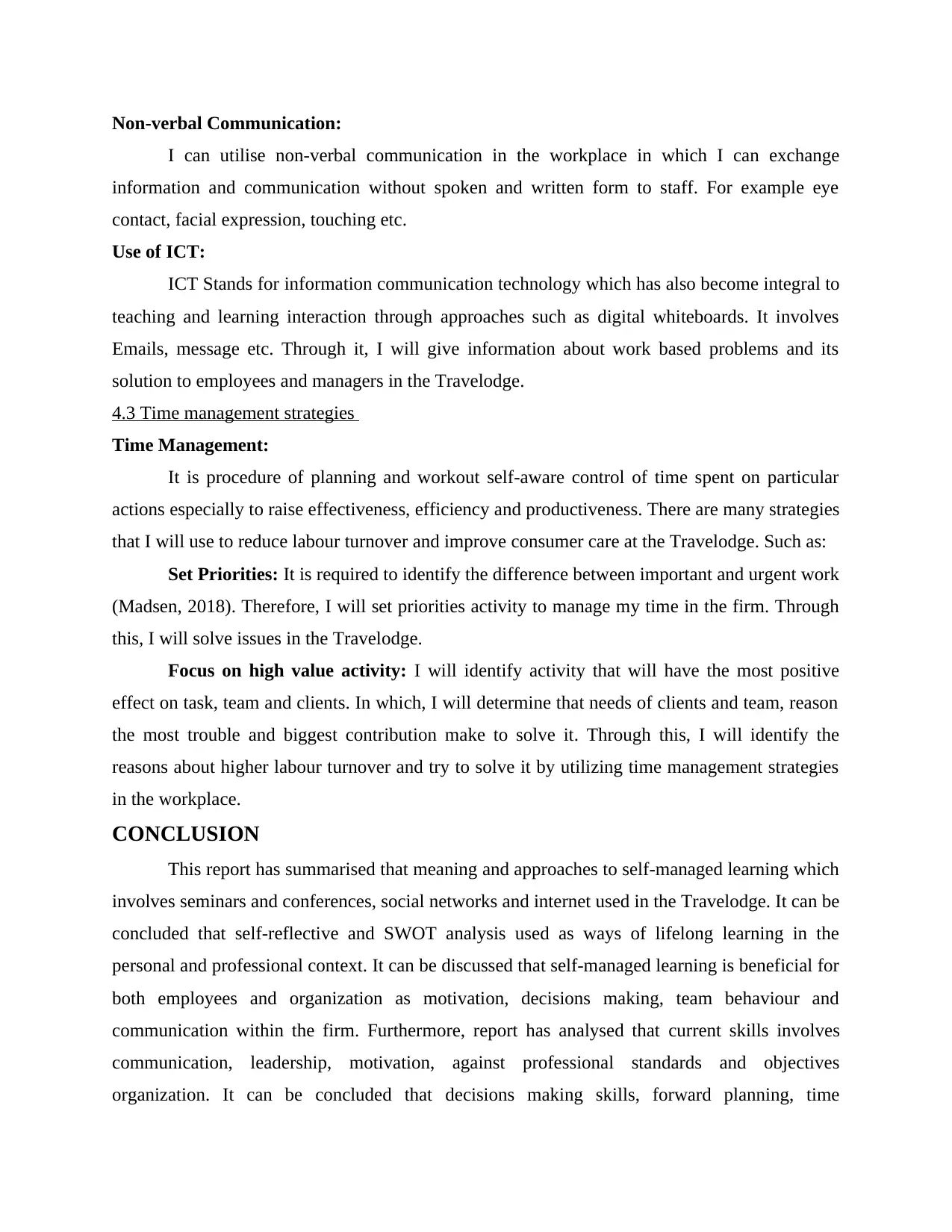
Non-verbal Communication:
I can utilise non-verbal communication in the workplace in which I can exchange
information and communication without spoken and written form to staff. For example eye
contact, facial expression, touching etc.
Use of ICT:
ICT Stands for information communication technology which has also become integral to
teaching and learning interaction through approaches such as digital whiteboards. It involves
Emails, message etc. Through it, I will give information about work based problems and its
solution to employees and managers in the Travelodge.
4.3 Time management strategies
Time Management:
It is procedure of planning and workout self-aware control of time spent on particular
actions especially to raise effectiveness, efficiency and productiveness. There are many strategies
that I will use to reduce labour turnover and improve consumer care at the Travelodge. Such as:
Set Priorities: It is required to identify the difference between important and urgent work
(Madsen, 2018). Therefore, I will set priorities activity to manage my time in the firm. Through
this, I will solve issues in the Travelodge.
Focus on high value activity: I will identify activity that will have the most positive
effect on task, team and clients. In which, I will determine that needs of clients and team, reason
the most trouble and biggest contribution make to solve it. Through this, I will identify the
reasons about higher labour turnover and try to solve it by utilizing time management strategies
in the workplace.
CONCLUSION
This report has summarised that meaning and approaches to self-managed learning which
involves seminars and conferences, social networks and internet used in the Travelodge. It can be
concluded that self-reflective and SWOT analysis used as ways of lifelong learning in the
personal and professional context. It can be discussed that self-managed learning is beneficial for
both employees and organization as motivation, decisions making, team behaviour and
communication within the firm. Furthermore, report has analysed that current skills involves
communication, leadership, motivation, against professional standards and objectives
organization. It can be concluded that decisions making skills, forward planning, time
I can utilise non-verbal communication in the workplace in which I can exchange
information and communication without spoken and written form to staff. For example eye
contact, facial expression, touching etc.
Use of ICT:
ICT Stands for information communication technology which has also become integral to
teaching and learning interaction through approaches such as digital whiteboards. It involves
Emails, message etc. Through it, I will give information about work based problems and its
solution to employees and managers in the Travelodge.
4.3 Time management strategies
Time Management:
It is procedure of planning and workout self-aware control of time spent on particular
actions especially to raise effectiveness, efficiency and productiveness. There are many strategies
that I will use to reduce labour turnover and improve consumer care at the Travelodge. Such as:
Set Priorities: It is required to identify the difference between important and urgent work
(Madsen, 2018). Therefore, I will set priorities activity to manage my time in the firm. Through
this, I will solve issues in the Travelodge.
Focus on high value activity: I will identify activity that will have the most positive
effect on task, team and clients. In which, I will determine that needs of clients and team, reason
the most trouble and biggest contribution make to solve it. Through this, I will identify the
reasons about higher labour turnover and try to solve it by utilizing time management strategies
in the workplace.
CONCLUSION
This report has summarised that meaning and approaches to self-managed learning which
involves seminars and conferences, social networks and internet used in the Travelodge. It can be
concluded that self-reflective and SWOT analysis used as ways of lifelong learning in the
personal and professional context. It can be discussed that self-managed learning is beneficial for
both employees and organization as motivation, decisions making, team behaviour and
communication within the firm. Furthermore, report has analysed that current skills involves
communication, leadership, motivation, against professional standards and objectives
organization. It can be concluded that decisions making skills, forward planning, time
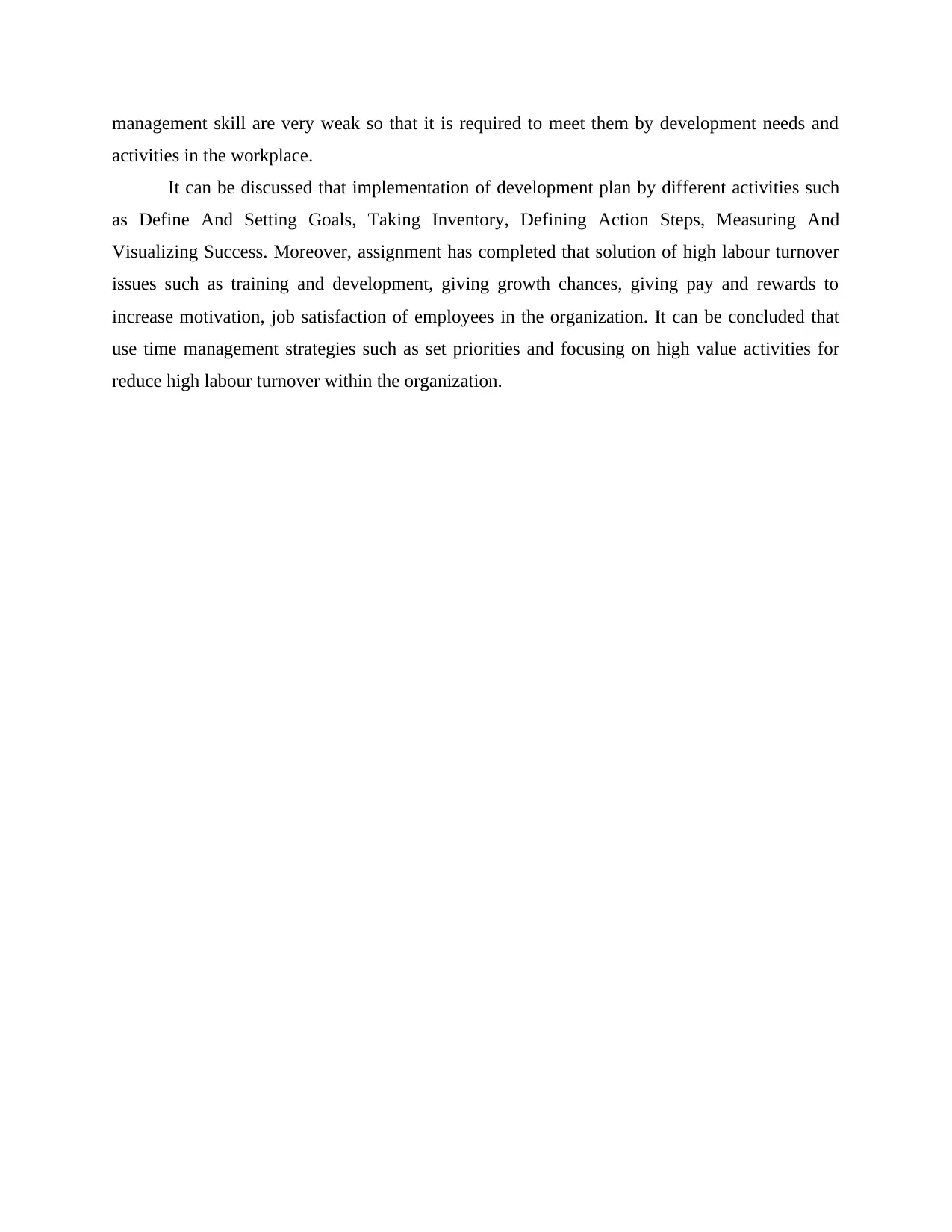
management skill are very weak so that it is required to meet them by development needs and
activities in the workplace.
It can be discussed that implementation of development plan by different activities such
as Define And Setting Goals, Taking Inventory, Defining Action Steps, Measuring And
Visualizing Success. Moreover, assignment has completed that solution of high labour turnover
issues such as training and development, giving growth chances, giving pay and rewards to
increase motivation, job satisfaction of employees in the organization. It can be concluded that
use time management strategies such as set priorities and focusing on high value activities for
reduce high labour turnover within the organization.
activities in the workplace.
It can be discussed that implementation of development plan by different activities such
as Define And Setting Goals, Taking Inventory, Defining Action Steps, Measuring And
Visualizing Success. Moreover, assignment has completed that solution of high labour turnover
issues such as training and development, giving growth chances, giving pay and rewards to
increase motivation, job satisfaction of employees in the organization. It can be concluded that
use time management strategies such as set priorities and focusing on high value activities for
reduce high labour turnover within the organization.
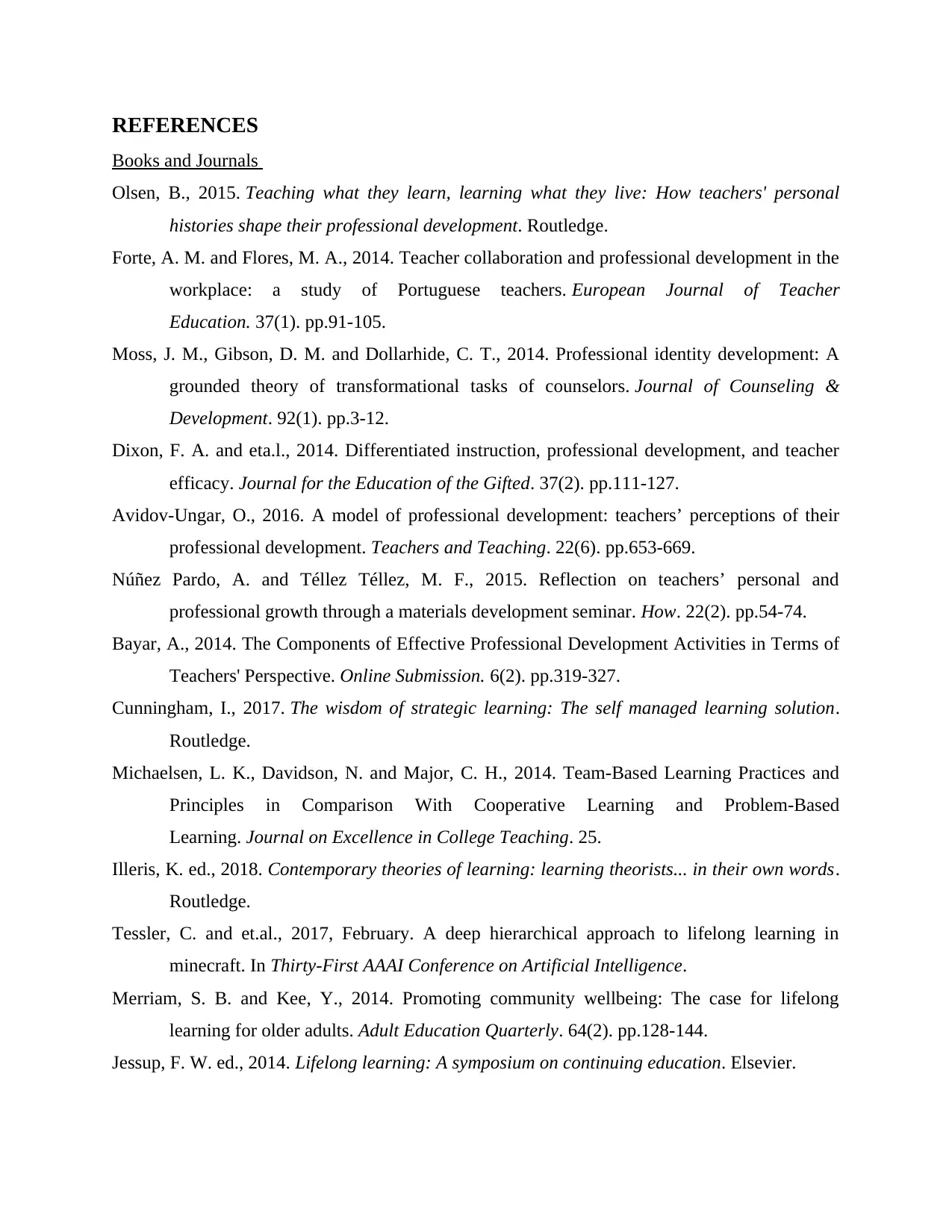
REFERENCES
Books and Journals
Olsen, B., 2015. Teaching what they learn, learning what they live: How teachers' personal
histories shape their professional development. Routledge.
Forte, A. M. and Flores, M. A., 2014. Teacher collaboration and professional development in the
workplace: a study of Portuguese teachers. European Journal of Teacher
Education. 37(1). pp.91-105.
Moss, J. M., Gibson, D. M. and Dollarhide, C. T., 2014. Professional identity development: A
grounded theory of transformational tasks of counselors. Journal of Counseling &
Development. 92(1). pp.3-12.
Dixon, F. A. and eta.l., 2014. Differentiated instruction, professional development, and teacher
efficacy. Journal for the Education of the Gifted. 37(2). pp.111-127.
Avidov-Ungar, O., 2016. A model of professional development: teachers’ perceptions of their
professional development. Teachers and Teaching. 22(6). pp.653-669.
Núñez Pardo, A. and Téllez Téllez, M. F., 2015. Reflection on teachers’ personal and
professional growth through a materials development seminar. How. 22(2). pp.54-74.
Bayar, A., 2014. The Components of Effective Professional Development Activities in Terms of
Teachers' Perspective. Online Submission. 6(2). pp.319-327.
Cunningham, I., 2017. The wisdom of strategic learning: The self managed learning solution.
Routledge.
Michaelsen, L. K., Davidson, N. and Major, C. H., 2014. Team-Based Learning Practices and
Principles in Comparison With Cooperative Learning and Problem-Based
Learning. Journal on Excellence in College Teaching. 25.
Illeris, K. ed., 2018. Contemporary theories of learning: learning theorists... in their own words.
Routledge.
Tessler, C. and et.al., 2017, February. A deep hierarchical approach to lifelong learning in
minecraft. In Thirty-First AAAI Conference on Artificial Intelligence.
Merriam, S. B. and Kee, Y., 2014. Promoting community wellbeing: The case for lifelong
learning for older adults. Adult Education Quarterly. 64(2). pp.128-144.
Jessup, F. W. ed., 2014. Lifelong learning: A symposium on continuing education. Elsevier.
Books and Journals
Olsen, B., 2015. Teaching what they learn, learning what they live: How teachers' personal
histories shape their professional development. Routledge.
Forte, A. M. and Flores, M. A., 2014. Teacher collaboration and professional development in the
workplace: a study of Portuguese teachers. European Journal of Teacher
Education. 37(1). pp.91-105.
Moss, J. M., Gibson, D. M. and Dollarhide, C. T., 2014. Professional identity development: A
grounded theory of transformational tasks of counselors. Journal of Counseling &
Development. 92(1). pp.3-12.
Dixon, F. A. and eta.l., 2014. Differentiated instruction, professional development, and teacher
efficacy. Journal for the Education of the Gifted. 37(2). pp.111-127.
Avidov-Ungar, O., 2016. A model of professional development: teachers’ perceptions of their
professional development. Teachers and Teaching. 22(6). pp.653-669.
Núñez Pardo, A. and Téllez Téllez, M. F., 2015. Reflection on teachers’ personal and
professional growth through a materials development seminar. How. 22(2). pp.54-74.
Bayar, A., 2014. The Components of Effective Professional Development Activities in Terms of
Teachers' Perspective. Online Submission. 6(2). pp.319-327.
Cunningham, I., 2017. The wisdom of strategic learning: The self managed learning solution.
Routledge.
Michaelsen, L. K., Davidson, N. and Major, C. H., 2014. Team-Based Learning Practices and
Principles in Comparison With Cooperative Learning and Problem-Based
Learning. Journal on Excellence in College Teaching. 25.
Illeris, K. ed., 2018. Contemporary theories of learning: learning theorists... in their own words.
Routledge.
Tessler, C. and et.al., 2017, February. A deep hierarchical approach to lifelong learning in
minecraft. In Thirty-First AAAI Conference on Artificial Intelligence.
Merriam, S. B. and Kee, Y., 2014. Promoting community wellbeing: The case for lifelong
learning for older adults. Adult Education Quarterly. 64(2). pp.128-144.
Jessup, F. W. ed., 2014. Lifelong learning: A symposium on continuing education. Elsevier.
Secure Best Marks with AI Grader
Need help grading? Try our AI Grader for instant feedback on your assignments.
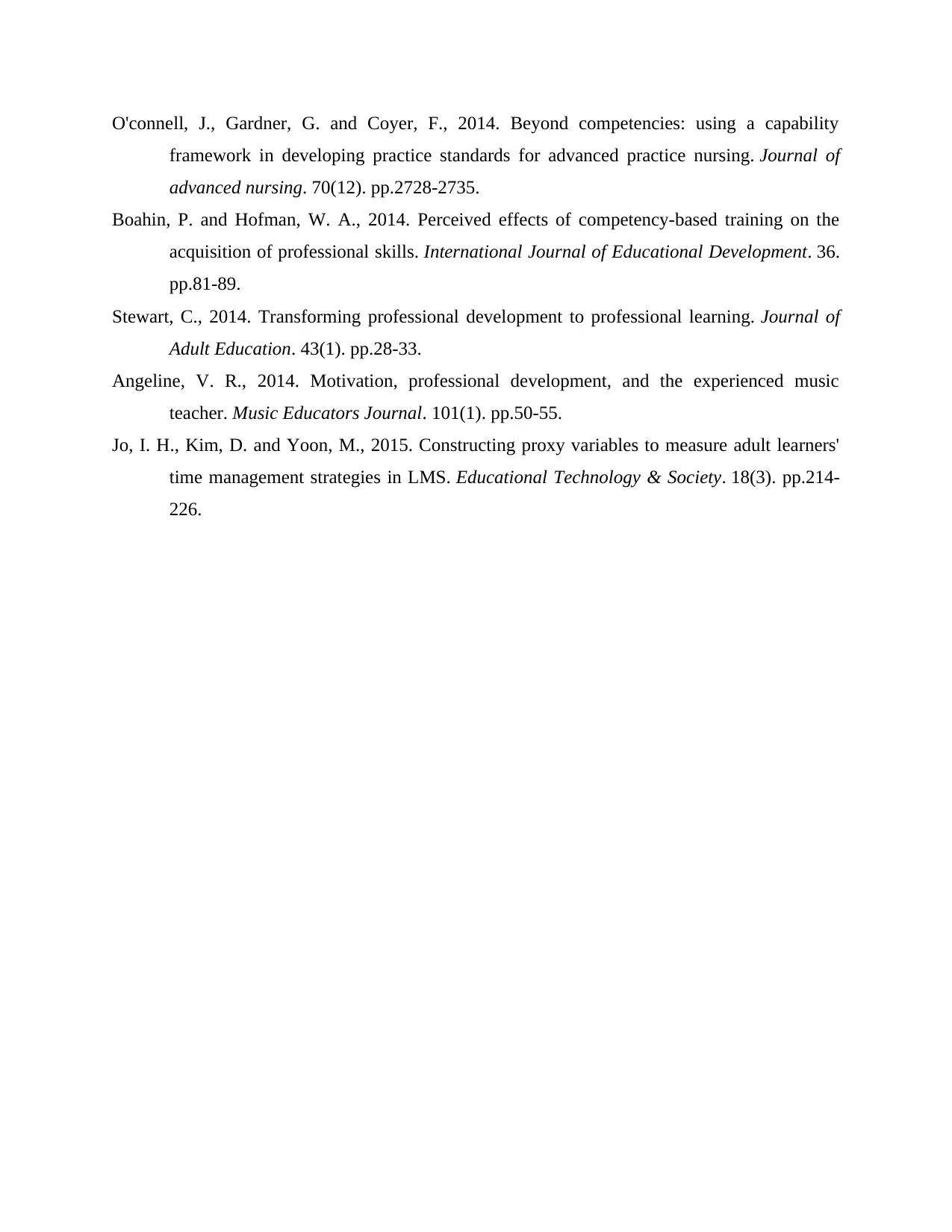
O'connell, J., Gardner, G. and Coyer, F., 2014. Beyond competencies: using a capability
framework in developing practice standards for advanced practice nursing. Journal of
advanced nursing. 70(12). pp.2728-2735.
Boahin, P. and Hofman, W. A., 2014. Perceived effects of competency-based training on the
acquisition of professional skills. International Journal of Educational Development. 36.
pp.81-89.
Stewart, C., 2014. Transforming professional development to professional learning. Journal of
Adult Education. 43(1). pp.28-33.
Angeline, V. R., 2014. Motivation, professional development, and the experienced music
teacher. Music Educators Journal. 101(1). pp.50-55.
Jo, I. H., Kim, D. and Yoon, M., 2015. Constructing proxy variables to measure adult learners'
time management strategies in LMS. Educational Technology & Society. 18(3). pp.214-
226.
framework in developing practice standards for advanced practice nursing. Journal of
advanced nursing. 70(12). pp.2728-2735.
Boahin, P. and Hofman, W. A., 2014. Perceived effects of competency-based training on the
acquisition of professional skills. International Journal of Educational Development. 36.
pp.81-89.
Stewart, C., 2014. Transforming professional development to professional learning. Journal of
Adult Education. 43(1). pp.28-33.
Angeline, V. R., 2014. Motivation, professional development, and the experienced music
teacher. Music Educators Journal. 101(1). pp.50-55.
Jo, I. H., Kim, D. and Yoon, M., 2015. Constructing proxy variables to measure adult learners'
time management strategies in LMS. Educational Technology & Society. 18(3). pp.214-
226.
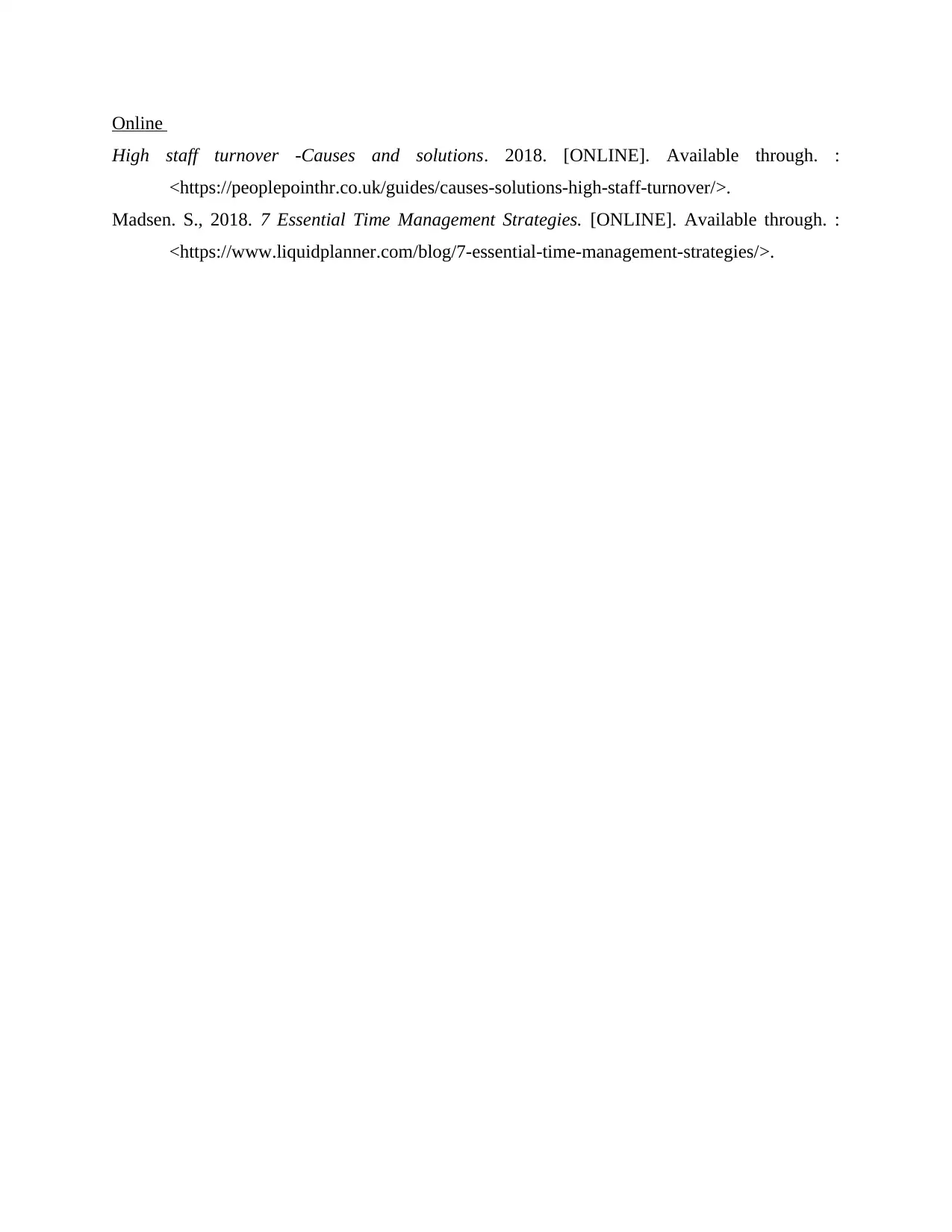
Online
High staff turnover -Causes and solutions. 2018. [ONLINE]. Available through. :
<https://peoplepointhr.co.uk/guides/causes-solutions-high-staff-turnover/>.
Madsen. S., 2018. 7 Essential Time Management Strategies. [ONLINE]. Available through. :
<https://www.liquidplanner.com/blog/7-essential-time-management-strategies/>.
High staff turnover -Causes and solutions. 2018. [ONLINE]. Available through. :
<https://peoplepointhr.co.uk/guides/causes-solutions-high-staff-turnover/>.
Madsen. S., 2018. 7 Essential Time Management Strategies. [ONLINE]. Available through. :
<https://www.liquidplanner.com/blog/7-essential-time-management-strategies/>.
1 out of 18
Related Documents
Your All-in-One AI-Powered Toolkit for Academic Success.
+13062052269
info@desklib.com
Available 24*7 on WhatsApp / Email
![[object Object]](/_next/static/media/star-bottom.7253800d.svg)
Unlock your academic potential
© 2024 | Zucol Services PVT LTD | All rights reserved.





